#but i'm rewatching locke & key
Text
I finished watching The Sandman days ago, and I’m still thinking about it.
I also finished Locke & Key yesterday, and I absolutely loved the way the show ended.
In other words, I am riding a show-induced high.
#Locke & Key#The Sandman#i can feel a rewatch on the horizon#maybe i should read the graphic novels of both????#i wish i knew people who liked what i like because i'm#just vibrating out of my skin w/o anyone to talk to
7 notes
·
View notes
Text
the structure, the "explosion", change and authenticity: a dissection of season 15
As usual I'm prefacing this post by saying these are my personal ramblings about always sunny meta so if you don't like to see that, then please move along.
When season 15 ended, I didn't end up analyzing it because my fixation had ended as well, so that's what I wanna do here, but in order to do that I have to touch on some themes that were heavily relevant in previous seasons but especially season 14.
I also want to properly explain why I've been calling season 14 "the last classic season of sunny", and why I think of season 15 as "a transitional season".
It seems weird, but I wanna start by talking about the season 13 episode, The Gang Escapes.
I've done a quick rewatch of s14 and 15 and the more I did that, the more I started to see Escapes like the predecessor for a lot of it.
So, in it, the gang is playing a game of escape rooms. They are trapped inside of Mac and Dennis' apartment, with only Dee knowing how to get out having done it before. Despite this, she is locked out, and is unable to help them. The boys separate and wrestle for a pair of heartshaped lock and key, and in the end, when they finally settle on how to open it, they discover that inside it says "And so the game begins".
The lock contains a ton of instructions on what to do next, but the gang quickly realizes they have run out of time and are unable to do them all, only for Dee to take the fall allowing them to win albeit in an unconventional way.
This episode reads to me like a cautionary tale on the fate of sunny.
Spending so much time on deciding how to do something or whether they should at all, that when they finally do it, they don't have the time to properly explore the choices they've made. As an example, this comes back with the concept of the seeds. In general, this is always touched upon whenever "imminent death" is explored, because it doesn't allow them more time to continue. This is often paired with a need to "go crazy/explode" by the end.
As a result, feeling constrained inside something and needing to get out before it's too late.
I'll elaborate more on all of this as we walk through s14/15, all the ways in which these themes come back, but for now I want to say that to me, this is likely how RCG has felt writing sunny sometimes: feeling too constrained/boxed inside the way they have always written it, that didn't allow them to branch out and explore the stuff they really wanted to "until the end", which in a way made them feel like sunny itself was the problem and made them consider ending it (aka cutting the head because the hair is a lie) to explore the stuff that interested them, rather than just... doing it while they have time, and being more loose with writing it in general (like how Gus said, the bible is a guidepost, interpretations can change over time).
As such, Escapes is an incomplete view on the situation, a negative one, it shows us what would happen if nothing gave in. Which isn't what happened in the end, but it's still important to keep in mind to read the rest of it.
This is, to me, why they even asked for four seasons in the first place. To have the time to properly explore all the things they wanted to touch on, with their new plan.
I'm gonna try to dissect every episode singularly (the ones I think are relevant anyway) and point out the connection in themes and what I think it all means. I tried to stay brief, believe me.
All in all, some of the themes I've found are as follows: the structure, death/catastrophe, running out of time/losing something (even disappointing an audience), change, and choices. They all apply to writing sunny.
Season 14
This season brings back a lot of stuff from past sunny. It seems s16 will do the same, but back when s14 was just airing, I remember this felt odd to me. Chokes is a direct continuation of dines out (with it being charlie and frank's anniversary dinner) and also calls back to mac's mom burns her house down and dennis system (with the whole poisoning someone so they can depend on you and nursing them back to health etc), poppins comes back, jackie denardo comes back (storm of the century, which also references bryan o' bryen), thundergun comes back, dee day (which is a continuation to mac day), global warming references Spies like US (the fish factory dudes), the waiter comes back... and so on. It felt like they were honoring the past.
But the reason why I consider it the last season of classic sunny, is because it's the one before change strikes. Many episodes seem to place us in front of an inescapable choice that leads to disaster. Some don't even offer a choice, just speak of imminent death.
The Gang Gets Romantic
Breaking this episode down, it's important because it introduces the whole concept of the "structure". A guideline, if you will, that the characters can either follow or stray away from. Throughout the two seasons we will see it redefined constantly, so it's important to understand what it is.
We are given two mirroring plotlines making use of this (romcom) structure. Frank and Charlie follow it pretty closely, and in the end they are rewarded with a romcom-y ending. Mac and Dennis stray from it, because they don't realize that the tropes are applying to the two of them, and in the end, their plans fail. This is actually counter to most other examples of structure that will be written later, and it shows us something important, which is that the structure can work if applied correctly and when appropriate.
So is the structure good or bad? Should it be followed? And what is it?
To me, the structure is a guide. It can aid you find what works on average, but it shouldn't lock you in. Exactly like structure in writing.
But it doesn't matter how you call it: the structure, the algorithm, god's plan, the bible, the base, the four walls encasing you, tradition; it's about something that gives you a foundation, but that you can branch out of, if needed. If your feelings tell you you should.
Multiple episodes will come to grips with this concept. Trying to run from it entirely, or embrace it to the point of almost doing things they don't want.
This is RCG's own struggle with understanding how to write sunny, and what sunny even is, hence why the main theme of season 15 is identity. How much can you stray from your core structure and still be yourself? How much before you don't even like where you're going? What defines you?
And in fact, a crucial theme in TGGR is falling back in love with something.
Pushing it away at first because you think you can get better than that or because you're bored of it, only in its absence to realize that it was already the perfect match. This is the charlie+frank/alexi+nikki plot (we'll be back in one year... covid aside, this is about the show returning and not ending), but it reflects season 15 in general (when you love someone, you can't bear to leave them behind).
Finally, "you think they're gonna give us a bad review?", hinting at the fear of how others will react.
Thundergun 4: Maximum Cool
The gang is selected to judge the sequel of a franchise they are big fans of. However, upon discovering the many changes applied to it (they're rebooting the franchise), they are disappointed and angered. In the end, Dee comes up with the plan that forces the franchise to go back to its roots, and the gang still doesn't support it.
So, how does this fit into our themes?
We have a franchise that has changed to the point of upsetting its fans.
We also have Dee once again being the key role in the story by coming up with the successful plan.
We have talk of a powerful formula that could destroy millions of lives in the wrong hands.
We have change seen as scary and upsetting, and we have talk of "rebooting the franchise".
Most importantly:
"Sometimes, in order to save something, you have to destroy something. And I think I know what we have to do to save Thunder Gun."
"Destroy it?"
This will plateau with Big Mo with its fake ending, but it speaks to the larger theme of considering ending sunny to get to the stuff they want to explore, only to realize they can explore it better if they start now and give themselves more time and just stay looser with the structure.
This is a talk they actually had with Larry David (who will be referenced as Larry Takashi later, creator of Fun Zone laser tag).
"McElhenney continued, “He (Larry David) said, ‘Don’t be an idiot. Never stop. Just keep doing it. One, because it’s the greatest job you could ever want and two, because if you do a final episode they’ll just destroy you for it.’”"
Around the same time, another article came out where Glenn mentioned wanting to follow Curb Your Enthusiasm's model.
"So with all these other projects, like last year, I'm sure you've talked now and again about ending the show for good."
G: "We talked about it. At a certain point, we might look at this and go “Yeah, we did it and it's time to move on,” and all that kind of stuff. But I think at the same time the way I see it, we're more like a band than a show now, where we all go off into our side projects, but like, this is the band, and if we feel like putting out another album, we'll put out another album. At this point, it doesn't really make sense to end the show in any official capacity. It's possible that moving forward we move to sort of like a Curb Your Enthusiasm model if we can get away with it. Larry David actually pulled Rob aside at some kind of a function and told him "One piece of advice I'll give you guys: Don't ever end the show. Just don't end it!” I think he figured that out after Seinfeld. I think he was really burned out. But with Curb he knows he might want to come back to it years down the line."
Keep in mind, when these two articles came out, season 15 had not even been written yet. Despite this, me and others started speculating that A. the seasons would return whenever instead of each year; B. each season would follow a story arc.
Seasons got shorter (and point A may still happen), and season 15 ended up following a story arc.
Finally, Dennis once again places us in front of a choice by saying "give me dong, or give me death", implying those are the only two options the franchise has.
Dee Day
There is a choice that has to be made by vote, and the gang is trying to sway the results. In the end Dee hatches a successful plan that just so happens to have the same outcome wanted by the gang in the first place.
We start with them stretching (irony not lost on me 😭) to stay loose because they're preparing for the plan.
"Can we just start?"
"No, we can't just start, okay? Preparation is the key to victory."
Reminds me of Chokes:
"Yeah, but can we just, like, play already?"
"No, we can't just play, Charlie. We can't just play."
"Are you insane?! We can't just play!"
Again getting lost on the how, on preparation, instead of starting. Arguing instead of opening the lock.
Additionally, it's said that Dee wants to do a whole retrospective of her characters. It fits with what S15 has done so far.
Still, we are shown Dee pulling the strings even when it comes to directing the characters.
"And like all great plays, this one is going to have a happy ending."
The Gang Chokes
Frank almost chokes to death during their dinner. Charlie admits he almost let him die because he was mad at him for "interrupting him". At the same time, Mac is taking all his cues to act from Dennis, even in drastic situations, instead of showing that he can make his own decisions, which is what Dennis really wants.
"I would've stepped in, but, of course, I was taking my cues from you."
"Why?"
"Well, you didn't tell me whether I should save him or not."
"But why?"
"I mean, why do I still have to tell you what to do?"
"And why is it up to me to decide whether or not you're going to save a man's life?"
Being able to make your own decisions depending on what you want to do, instead of always following someone else's directions, regardless of what the outcome is...
"So you were still gonna rely on a decision that somebody else made, only, this time, you were potentially gonna kill a man?"
Dee also starts living on the edge of life and death because it gives her a thrill, but ultimately experiences true death and realizes there is nothing on the other side.
Frank goes to live with someone else (the waiter), but in the end realizes Charlie was already perfect for him. Once again, breaking out and almost ending things only to see all he already had in the end, because Charlie apologizes to him.
And Mac learns to make his own decisions instead of depending on others. Like the structure meta.
The Gang Texts
The bananas thing with the gorilla.
"I sit there, eat a banana real slow, and he comes up to the glass, and he's banging on the glass like the dumb ape he is."
"It will bang its hands bloody trying to get the banana."
"How is that funny?"
"It's funny 'cause he can't get the banana."
Just like the seeds in s15, it's about writing, or rather questioning the way they have written things in the past. Frank insists withholding the wanted thing is hilarious, and Charlie questions it.
Like in Still in Ireland:
"Oh. I should eat it again. Then it would be funny 'cause I didn't learn my lesson."
"No, that wouldn't be funny. It'd just be kind of dumb, you know."
Deriving humor from the characters never learning their lesson, being beaten down by the narrative, never getting what they want. Which is a key component of the classic sunny structure. The meta is questioning it, probably because there's many things RCG wants to do that would go against this. Just like the Shelley arc in s15, after all.
In the end, the characters are allowed to understand each other, looking each other in the eyes as the circle of life plays.
The Gang Solves Global Warming
Talk of an imminent crisis. People are gonna revolt soon (like the audience for Thundergun), and the bar (which has often been used as meta to represent the show) doesn't have enough resources to accomodate everyone.
"We didn't have enough to accommodate the people that were here before, and now it seems like we've doubled in size and we just don't have enough."
"Where is your God now?"
"He will reveal himself at some point."
"Oh. Well, is he gonna do it before all these people revolt and destroy the place?"
"I don't know, Frank. I don't question God's will. If he wants to destroy the Earth, that's on him. I support it!"
Could refer to both RCG's burnout as well as not having enough time. Either way, it leads to disaster.
Mac talks about God's plan, something that is predetermined and thus cannot be changed.
"Guys, we don't really have to worry about global warming, because... yes, is the Earth getting unbearably hot? Of course it is. But it's all a part of God's plan. Look, if God wants to roast us like turkeys, there's got to be a good reason for it."
Mac acknowledges that the plan that is locked in is leading to a horrible unbearable outcome, but still insists there's nothing they can do to change that ending.
"See? It's all a part of his divine plan, Dennis. And that's locked in, so we're good."
"Okay, so all we have to do is nothing?"
"No. No, because... we have free will, Dennis, which means that we have to take the necessary steps to make sure that that plan comes to fruition."
"Which is predetermined."
"Yes."
"But it doesn't matter what we do if it's all predetermined. You see how your argument... doesn't make any sense?"
Just like the structure, this plan doesn't allow the characters to change anything, and it only leads to eventual doom. Or imminent death.
Paddy's Has a Jumper
There is a man who wants to end his own life on the roof of Paddy's, and the gang uses an algorithm to try to determine whether they should do something about it.
So there is a threat of imminent death, and through the algorithm (like the structure), they have to decide how to proceed, only the algorithm eventually leads them down a path they are not fully comfortable with, pushing Bryan off of the roof.
The episode starts with them watching an episode of a show on TV, and being surprised by a twist (a marriage proposal... thinking of dennis' shell that can only be broken by marriage... anyways). The algorithm decided they would like this show, but we learn at the end that they didn't (once again, the audience revolting, whether it be thundergun fans or patrons at the bar).
At the same time, it's repeated that this algorithm takes the emotions out of decisions:
"So, guys, I think I have a way that we can solve this argument without human emotion mucking it all up."
"I don't need your opinions. Okay? 'Cause based on the analytical conclusions that we draw here, we're gonna be able to come up with a mathematically-accurate, non-emotional answer to all of our questions. Okay? We just need to think like a computer."
"Well, it still feels a little weird, but feelings are irrelevant in the face of facts. Is that what I'm hearing? The feelings... feelings just get in the way."
I remember when this episode aired, people interpreted Cricket getting the casaba melon in the end as David Hornsby writing the finale of the season, Big Mo. The casaba representing the show, plus the talk of "helping Bryan die" and "crashing the casaba melon" with him catching it sounded a lot like "ending sunny", which plays both into Big Mo tricking us into thinking sunny was ending, and later acting like the finale to classic sunny. One last season following the old structure before RCG allows themselves to change things up in way that could be risky in fan reception.
This whole episode, with the discussion on Bryan, the egg, and the casaba, reads like RCG deciding on what to do with the show. Do we end it? Do we change it? What makes the most sense vs what do we want to do?
"And then we could be known as a suicide bar, and that's no good."
"I don't want to be that."
"Yeah, kind of grim."
"I'd probably take my business elsewhere."
"You don't have business."
"What, uh, what if you lean into that, though?"
"Like, you don't make it grim, but you make it playful."
This decision they keep hinting at could shift the tone of the show forever, and potentially "drive away business".
So they want to try to decide on it by sticking to what works mathematically, in this case the algorithm, however... it doesn't reflect their feelings.
"Uh, yeah, I know, but mathematically we were supposed to kill a man today."
"Maybe that's, like, part of the problem of, like, taking the humanity out of decisions."
"Perhaps the science just isn't there yet."
When it comes to exploring the canon of sunny, there is a lot that, if the normal sunny structure were to be used, would never be explored in an emotionally satisfying way, which is what RCG ultimately wants to do. I remember when Mac Finds His Pride first came out, Rob kept insisting "the characters change, but they don't evolve", and when faced with so much criticism about the episode not feeling like sunny, he answered that "he decides what feels like sunny, because he's the writer".
I quote:
"What was the reaction like to your epic dance number in the season 13 finale?
MCELHENNEY: It was both negative and positive, which is one of those things we talked about. It’s great to surprise people and have them not have any idea what we’re doing and why we’re doing it. I have people saying, “Oh my God, I love this, it’s one of the best things you’ve ever done,” and then I have other people saying, “You’ve destroyed my show, you’ve ruined it.” And I’m like, “Great!” That’s exactly what we should be doing on the show, is we should be destroying somebody’s idea of what Sunny is on a regular basis.
OLSON: It was kind of weird just how many people would just blatantly comment on his body and to me, and we were like, “What would happen if they were commenting on my body to you? Like, ‘Ahh, Kaitlin’s chest…’”
MCELHENNEY: A lot of people didn’t like it. Because a lot of people felt like it didn’t fit into the lexicon of what the show is. And I can’t say that they’re wrong, but the difference is that I get to dictate what the lexicon is and they don’t, and that’s a part of the experience."
This episode is also where a lot of explosion talk happens, with Mac and Dennis mentioning they crave it, and the way they want to reach it is by destroying the casaba melon (which as we've established represents sunny).
In the end, it's discovered it's where Frank hides his weed ("I don't think you have to hide it, man"), and Frank reveals it's also "full of loads".
A Woman's Right To Chop
An episode fully about choices and their perceived life altering consequences. Dennis and the rest of the boys want to control what other women decide to do with their hair, Dee defends their right to do it. There's talk of tradition and "upsetting the natural balance of things". The tradition thing will be brought up again in the finale of s15.
I wonder if Poppins could also be considered a metaphor for the show itself. Very old, but full of potential new life that, if let out, could kill them.
Either way:
(Talking of Keri Russell) "Millions of adoring fans, hit television show, you know, and then she went and did this."
"Shocking, isn't it? With this one tragic decision, Keri Russell alienated all of her fans, she got her show canceled, and man, she was never heard of ever again."
Frank's talk about cutting all of his hair and losing it forever due to this drastic decision also fits. Burping from his backed up valve due to missing what he lost, the hair that never grew back ("And you're not just giving up being at the top of the leaderboard at some, you know, laser-amusement-themed park, man, you're talking about giving up everything. Everything. Everything we built. Everything we worked so hard for.").
Waiting for Big Mo
And we're finally at the finale for season 14. This episode was structured to trick the audience into thinking the series was ending with its walking out. Not only that, but it's a key episode for meta interpretation of these two seasons.
"Time to end the game" echoes Escapes' "And so the game begins". Because it references the same thing, the game being the show itself.
This is reinforced by the gang saying "it feels like they've been playing it forever", "they never win anything" and that "they get to go crazy at the end of it".
But if the game is sunny, what is the base they're trying to defend? That is the structure.
"Just guard the base, man."
"Kind of sick and tired of guarding the base. What if we go out there, run around? I want to go out there and have some fun, man."
"We gotta guard the base. That's what we always do, and that's what we figured out works a long time ago. Plus, we're waiting for Big Mo."
Dennis is desperate to hold the base and protect it because it's what they've always done, and because Big Mo is threatening to take their place on the leaderboard.
If they were to go out, run around and explore, they would go down the leaderboard, and that is exactly what happens.
"Oh, Charlie, you got to get out there with us. It's so fun. We're finding all kinds of corners of this place that we've never explored before."
"Yeah, I'd love to, I really would, but we're actually... we're losing right now."
An article from season 13 times about "Mac Finds His Pride" reads:
“Some of the uncharted waters, if you want to call them that, were genuine emotion,” Day said on a 2018 Television Critics Association panel. “Once we stumbled on the episode becoming more about Frank being more tolerant and accepting something, we thought, well, this is something we haven’t really done. Our characters rarely change or learn.”
To me, this dissatisfaction is something they felt for a while, and the first time they started really having fun with it again was when they decided to have Mac come out, in Hero or hate crime specifically. That is, because until then, the characters being incapable of change was part of the structure of the show. Something that allowed no wiggle room. But the audience making themselves heard after Goes to hell came out showed them it didn't have to be that way, necessarily.
It didn't come without struggle though, this interview from TheWrap reads:
GLENN HOWERTON: "He’s out (Mac). It’s definitely a big deal for us. I never thought we would do that. … I was against it at first, and the reason I was against it was his character has always been an opportunity to satirize a particular attitude, that still sadly exists, that there’s something wrong with being gay.
And I think that it was important to me at least to maintain that level of social satire which is such a big part of the show to me: taking an attitude, taking a point of view that exists in our society, and giving it to one of our characters and sort of blowing it out of proportion. Watching the inevitable outcome of the most extreme version of that point of view.
That’s always been my M.O. in terms of the writing of the characters. And to me there was always such a darkly comical and sad element to having this character continue to deny his own sexuality because of the societal pressures that he put on himself… that he had internalized.
So I never wanted him to come out of the closet because I thought that to me is… showing just how deep that mentality goes. And despite all the evidence and despite all the support of his friends, the man will still continue to deny his sexual orientation.
But then I got to a point where I realized, I’m holding too hard and fast to that rule. And I think we have made plenty of jokes in that arena. We’ve satirized that to death. What sort of possibilities does it open up when that character finally does come out of the closet? Which is why we decided to have him come out once and for all."
Mac coming out forced RCG to reassess to which level the characters were in fact allowed to change.
This article from 2019 has him saying:
“we wanted to make sure that even though the characters might change, they don’t evolve. We wanted to make sure that he (Mac) doesn’t become a better person or a sweeter person or more endearing person or a nicer person. We felt like we wanted to still keep the tone. So I would say, in all the right ways, things remain exactly the same.”
And the amount of change the show as a whole was allowed was something they've grappled since, and something I'm pretty sure caused Dennis Double Life (I mean, Dennis being mindnumbingly bored at how everything stays exactly the same - like his own apartment - but running away at the possibility of change, with the RPG "on the table"...).
Anyway, during the whole episode, the others keep wanting to quit the game for good, because the way Dennis is making them play is miserable, and they'll only be allowed to have fun at the end.
"I actually got an idea. Like, what if you guys don't play the game up in the air ducts this time, but you go down on the floor? Where everyone's having all the fun?"
"They look like they're having so much fun playing laser ta..."
"Will you shut up?! This isn't about having fun. Okay? This is about staying alive and winning."
Dennis (in true double life fashion from him...) places this dilemma like an impossible choice: either you stay alive, miserable, and win, OR you have fun and eventually Big Mo (imminent death) gets you, and you're forgotten. He doesn't see the answer in the middle, which Charlie is quick to point out: playing the game AND having fun with it, not caring how it affects "how well they're doing".
Eventually Dennis learns about what really happened to Larry Takashi (aka Larry David), and the whole gang, for a moment, agrees to "end the game", aka end the show. This was obviously a fake show ending, finishing with them saying "they're never going anywhere". But why is that? Because instead of guarding the base, they decided to play by their own rules.
As such, Big Mo still acts like a show finale, to what Sunny was prior to this decision.
This brings us to...
Season 15
Introduced with the trailer description as "new era, same egos",
Predictably, this season ends up "breaking the bounds" of philly, to travel all the way to Ireland. As Big Mo had announced, they "went out to explore"... but literally.
What happens next is the natural first step of exploration, aka reassessing your own identity.
Season 15 isn't the "franchise rebooted" just yet, it is experimentation. Experimenting with how far they can push things, getting comfortable with the new structure (of a season arc, and otherwise).
With an end comes a new beginning, and a question, what is sunny now?
So, the theme of identity touches every single character on its own, each with their personalized arc that ends with the character coming out changed in some way. This is why to me season 15 is transitional. The show, the characters, are finding new footing. This is especially true for Dennis, whose character has been intrinsically linked to sunny meta for a while now, but I can't fully get into that here (or I would derail the section. I get into it later a bit. also I have gotten into it before tho, though the post is slightly old so some parts may not hold up).
Some characters attempt to cling to their roots, others run from it.
All in all, this season challenges each character on one fragment that always defined their identity, and has them come out of it with a new understanding.
As a matter of fact, this is, to me, the first season where all the characters are actually allowed to develop.
Trying to keep to the point before we get into each episode, here is the arc that each character goes through:
MAC: At first, he is compartmentalizing his own identity. Depending on what he feels is the dominant one, he feels he has to act accordingly, and every single decision is dictated by this. He places great importance on his irish roots, when all of a sudden, this belief is challenged when it is "discovered" that he's "actually dutch". This sends Mac into a spiral, trying to determine what really defines him now that his roots are out of the question. He can't reconcile the fact that different aspects can coexist in a singe person, hyperfocusing on one at a time. Until it's revealed in the finale that he is in fact irish, and Dennis and Charlie tricked him. ("So you thought you'd just unravel my entire identity?" "Nothing's unraveled! We didn't unravel anything! You're still you! You've always been you!"). So what does Mac gain from this arc? Another shamrock tattoo... no, I'm kidding, he gains security in his own identity outside of outside validation. For a moment he experienced what it was like to have everything you thought you knew about yourself be shattered, and what it gave him was an awareness that you're still you even in the face of change, and a determination to stand his ground. All in all, to me, his character is the one who actually changed the least (makes it counterproductive that I'd talk about him first...), which is why season 15 throws him for a loop. RCG already had him where they wanted as far as development goes at the start, due to the fact he was allowed to develop in past seasons as well, so what they did instead was bring him back to a previous point, reawakening his insecurity in his identity. He thought he knew pretty well who he was, until he didn't. And then he's sure again. What this did was have him see that it really didn't matter in the end, he was always him. Another thing this arc did was set him free from his dad's shadow for a moment, as he got another last name. That's because, as the gelled back hair would remind you, he's always looked up to and wanted to prove himself to his father. As MFHP marks the climactic point of Mac trying desperately to have his dad understand his identity, and failing, Jumper shows us that he still thinks of his name in a positive light or at least tries to defend it still ("My dad's name is an homage."), like he's still in denial. In a way, by assigning him the Vandross last name for a while, he was allowed to cut ties with his own name and exist as someone else, only to come to the conclusion that nothing really changed about himself, and he shouldn't stress about identity so much.
DENNIS: In many ways, Dennis' arc is the foil to Mac's. Unlike Mac, Dennis doesn't want to hear a single thing about identity. He doesn't think it should play a role in the decisions you make at all, in fact he thinks no action you take can ever define your identity, and you are whatever the hell you say you are, regardless of where your heart's taking you. Now, on some level, his argument may appear reasonable, or at least more grounded than Mac's. It's true, "Identity doesn't have to factor into absolutely every decision you make.", and you do have power over how you define yourself at the end of the day. Dennis being Dennis, however, we all know the extreme to which he's taking this. He is drowning in denial. Refusing to accept reality at every turn. He doesn't have covid, he's just allergic to sheep wool, and the castle looks great, it's not decrepit. So, Dennis starts the arc with one main ambition: have an authentic experience. He's obsessed with things being true, being tampered with. This is also a season theme, in general (the burning of the shredded documents for example), which again plays into how Dennis meta is almost always show meta as well, but I digress. He forces himself to do things the european way, effectively running away from his roots entirely. The opposite of Mac. Throughout the season however, things escalate. He gets worse, and he starts doing things the old way regardless (like driving the wrong, but right for him in philly, side of the road). It reads like he's trying to negate his actual authentic nature, while being driven insane by the perception of others doing this as well. He wants things to feel authentic, he just can't figure out how, because he can't see as he's blinded by all the denial that's literally almost killing him (you could say he's been trying to pull the wool over our eyes...). It's hard to define in this arc which exact aspect of his identity is challenged, because it's all of them. As the finale states, his whole "essence" is broken, his back, you know, the structural foundation of every person, ("You've always said that your back has the symmetry of the Vitruvian man, and it's the foundation of your structural essence.") the structure of the show, the structure of Dennis. This is another way in which it is a foil to Mac, as he is already secure and open about who he is exactly, while Dennis denies all of it. They're like opposite extremes for how to tackle the structure, and the answer of course lies in the middle. (wink. see I told you it's impossible to write impartial sunny meta, because macden is intrinsic to it... anyway). By the end of his arc however! Dennis has admitted to himself that he had covid. Almost dying from sheer denial gave him enough of a scare to cut that out, if you will, and I can't tell you what the new Dennis will be like or what he has gained besides the lack (or decrease) of denial, because his change is the most fundamental. He will probably be further redefined in season 16. All his identity was impacted.
DEE: This one's easy, what is something that has always defined Dee's identity, to everyone and herself? (Clip Show: "Dee, are you a successful actress?" "Oh, I could have been." "Dee, be serious! Yes or no?" "No.") Since always, she has wanted to be an actress. Finally, she gets the once in a lifetime opportunity to be just that. Earlier in the season, it is hinted especially with her acting classes that what he really wants is to have power and control. This of course echoes what we've seen of her in season 14 (and prior), she comes up with the plans, pulls the strings, prefers to be the director. However, what does an actor do? Follow orders and directions. Previously, she fell into this role due to her search for validation. This is shown with her literally begging the director to have a role. Her arc shifts her character from looking for others' directions, permission and validation to gaining agency (which even echoes thundergun 4! "So, you... you want the female characters to have less agency?") by crushing the possibility of her becoming an actor, her last chance, all the while showing her how miserable it truly is to have to follow everyone else's lead. Anyway, now that the actor fragment of her identity is put to rest, she is free to redefine herself and take charge. Additionally, Sinks in a Bog may have also started a thread to redefine the way she sees female allyship, in fact I think it was the central theme of the episode for her. Thinking back to Making Paddy's Great Again, she was willing to get rid of a perfectly fine new gang member in favor of Dennis, just because she was a woman which made her feel threatened. In Thundergun 4, similarly, she feels threatened by the new female character, and wants other women to be below her, is always in competition with them. Bog puts her in a situation of need where only the Waitress, another woman, can help her. In the end, she lets the Waitress sink in order to get out, but the episode still forces Dee to face a situation in which women working together is the only viable way to get out of trouble. I don't think this specific arc is finished yet for her, but I wanted to mention it still.
FRANK: Another easy one. Thanks to MFHP and the discussion surrounding it by RCG, we know that the role of Frank in the gang is that of surrogate father. However, just because we the audience know, does not mean he does. Frank as a character dismisses responsibilities such as "being a dad". He may show the occasional tender affection towards Charlie, but those moments are far in-between, and when asked if he's Charlie father, he has run from it in the past. We, like him probably, always assumed in the end that he was indeed Charlie's biological dad, despite the lack of test. Season 15, of course, puts a wrench in all of this. This is the fragment of Frank's identity that gets challenged, his fatherhood. Not just to Charlie, but to Dennis as well, which he ends up treating as a "rebound son" and bonding with while he is separated from Charlie. Frank has always kept people at a distance, and almost losing Charlie reminds him to treasure what you have, otherwise you run the risk of losing it. By the end of the season he's almost flipped, in that he is willing to show Charlie that he is "useful", to make himself worthy of being in his life, instead of expecting it. What he gained, in my opinion, is feeling comfortable with the idea of being a father. Actually wanting it. Finally stepping into the role of "the gang's surrogate dad" that has been preannounced ever since MFHP. So that's how his identity was impacted. Not saying he's gonna become dad of the year, just that he's now open to seeing of himself as a dad at all.
CHARLIE: He is the protagonist of the season, the one that gets to have the big emotional beat of the finale, and as such I've left him for last here, because there's more to chew on. Charlie isn't setting out to do anything when he arrives in Ireland. He's pretty content in how things are and who he is, he's just along for the ride... or so he thinks. By finding out the existence of his actual biological dad and meeting him, he is confronted with a whole world of... everything he's ever wanted. Suddenly, what he had before doesn't cut it anymore. He wasn't looking for this, but as he stumbles on it, he realizes quickly that it's everything he's been missing out on his whole life. He wants to start fresh with his dad, wants to learn more about his roots, he is ready to abandon the life he thought he was content in, because he sees how incomplete it actually was. Only... that's not how life works. You cannot alter the past. You can only impact the future. ("The first time round is a bitter pill, but the second chance is better still") He cannot make up for all the lost time and chances, because his dad dies. ("You weren't there! And I needed you! I needed you there. You were supposed to carry me!") The finale says it best: "I'm glad you're dead. Now I don't have to spend the rest of my life waiting for you to pick me up." Charlie, like Dee, is allowed to move on from a fragment of his identity that was weighting him down. He's allowed to let go of his need to know who his real dad is, and is rewarded with the knowledge that he does have people who care for him despite everything. His identity is thus also redefined: he's no longer waiting to know who his "real" dad is, because he knows what makes family real.
In a way, this is the "Big Mo" we'd been waiting for. Despite the apparent negative outcome of the trip overall, the team underwent successful arcs that ended with them all together in the bar, deciding to go back up there on that mountain and help Charlie finish the job ("No hesitation, no surrender, no man left behind!"). Just like a sports team getting "in the zone" and starting a winning streak by working together really well.
So, lets get into the episodes.
2020: A Year in Review
Talk of wanting to set off fireworks in the bar to celebrate.
Obviously, this refers to how sunny passed the record as longest running sitcom with its fifteenth season, but let's also look at the dialogue:
"What if we let off some fireworks in here, huh?"
"Fireworks in the bar?"
"It's never been done before. Right? That could be kind of good, right?"
"You'll burn the place to the ground."
The kind of explosion Charlie wants to set off because "it's never been done before" (echoing Big Mo... exploring new things) could potentially destroy the bar... which, as always, is a metaphor for the show.
The evergreen bar = show metaphor doesn't stop here however.
The gang is expecting a "huge potential investor" and they're gonna try to ask him for a loan for Paddy's pub.
In the past year they've asked for, and gotten, plenty of them for their own little side ventures/failing businesses, and now they want one for their main thing, the bar.
He's not there to give out PPP loans though, what the guy is actually there to do is collect on the ones already given.
Here's how I interpret this. Think of every season a show is given, as a small loan of a set number of episodes that they will then use to tell their story.
Throughout the years, sunny has been given plenty of these, and rarely has it used them to explore a lot of canon, because of the structure of the show that didn't really allow for it.
This is the same sentiment as Escapes, the fear of not being allowed more time, more seasons, to actually do all the stuff they want to do, that they were saving for "the end".
Because as the man hears all the ways in which they have wasted the previous given loans, he obviously doesn't give them another one for their actual main business venture.
So, Mac and Dennis decide to get involved with the election, and as such their loan is for tactical gear, but they end up getting sidetracked entirely, running their own separate poll where people get to vote, while also getting back to their initial thing of singing together.
"Now, the labeling... in hindsight, was a bit obtuse and created a great deal of confusion."
"It kind of backed up the whole system."
"Right. Yeah, there was a whole kerfuffle... I don't know if you remember this... about, like, what votes were supposed to be counted and what votes aren't gonna be counted. And are these legitimate votes, are these not legitimate votes? What's this, what's that? I mean, we put our boxes all over the damn place. So, you know, we created a mess."
This ep also has the whole running out of materials thing that Global Warming did for when Charlie and Dee are making masks and it's hard to meet the demand.
"Um, so, hey, listen, um, listen, we really do believe that with a major cash infusion, we could turn this bar into something..."
"No, no, no."
"...even more successful than it already..."
Thankfully, as we've covered, they managed to get four seasons, I'd say that's a pretty big loan that can only be justified if you have some sort of plan... to "turn this show into something even more successful than it already is".
Or perhaps just to do something so altering that it's potentially show ending, without the fear of getting cancelled immediately.
The Gang Makes Lethal Weapon 7
As this episode has the gang directing a set, it's easy for some elements to mirror the making of sunny, as that's the intended thing in the first place. (stuff like "We could make this more of an art house film. I'm open to it.", whereas in Thundergun 4, their role was that of the audience, which is why there Mac goes "I hope they don't show us some boring art house movie.").
There's talk of a big bang, "I'm sick of getting jerked around, I'm ready to explode".
They start to redefine who the "villain" of the story actually is, something that will also come up later in Mac's discussions about God with Gus. The concept of a vengeful God set out to send a catastrophe to smite and punish them. Like Global Warming. An imminent death, in this case in the form of a tidal wave, an act of God.
I think it's interesting how throughout these seasons, this talk of a "big event", an explosion, is both talked of as a huge catastrophe, yet something that is deeply craved.
Reminds me of Chop, again:
"They're clearly bored and lonely and needing to do something extreme in order to make themselves feel special."
"Take this one for example. You don't get a monkey cut like that unless you're broken inside."
A chop, an action that's so drastic it could potentially destroy everything they've built...
"Out of the smoldering ashes, however, I pieced together a cautionary tale. An exploration, not of what is gained by learning, but of what is lost by staying ignorant."
They can't change the past (the first time round is a bitter pill), but they can embrace the future (the second chance is better still), taking what feels like "smoldering ashes" and exploring the lost potential that staying ignorant left them with. In the case of season 15, Charlie couldn't stay with his father and all he was left with was the missed chances ("You weren't there! And I needed you! I needed you there. You were supposed to carry me!"), but in the midst of this, Frank learned the importance of his role as a father (and then we find new seeds to sow, to grow our love we didn't know).
The Gang Buys A Roller Rink
As always, the bar = show metaphor makes a reappearance.
This one is packed, but to summarize, this as well is about falling back in love with something. Or rather... the first half of it. The falling out.
Imagine you've been with something your whole life, you start forgetting why you kept choosing it to stay in your life (reminds me of dennis being asked by he lives with mac in clip show...), you slowly grow bored of it as you realize that it has never changed. You've kept it exactly the same.
You think that means something has to change, something has to give.
You fantasize about how different things could be... that's the roller rink. The roller rink serves the same purpose as them going to Ireland... going as far away from their base as possible, because of this need for change.
Except...
"Don't it always seem to go
That you don't know what you got 'til it's gone?
They paved paradise and put up a parking lot"
Once again, the implication being that they stuck with it for so long for a reason. The show, that is. Or the bar.
But that's not all this episode talks about to me.
Because it shows the gang acting very uncharacteristically, especially in regards to Dee.
"You know, Dennis looks like Jerry Seinfeld."
"Thanks, man. Yeah, that's kind of what I was going for."
"I don't like how mean they are to each other on that show."
"Aw, Sweet Dee. So pure of heart. You know?"
"Hey, when you going to Hollywood, Dee?"
"Tomorrow. Yeah, this is my last night in Philly. I'm actually super nervous."
"Oh, you got nothing to be nervous about."
"No, you're gonna do great out there, sis. They're gonna love you. You just have so much natural charisma, and you're so funny."
"Such a good-hearted person. Guys, thank you so much for not making fun of the size of her feet. They're very big."
"Oh, no, dude. I would never make fun of her physical attributes."
"Look at her go, man."
"Yeah, she's really flying, huh? Imagine if she didn't have to slow down for her friends."
"She doesn't have to. No, no, no. I... When she asked me to tighten her skates, I secretly loosened them, you know, 'cause real friends don't slow each other down, right? They help them soar."
These are all very "unsunny" moments typically ("I need their aggression at a ten"), especially in the context of the episode where we're meant to read the roller rink stuff kind of as anti-sunny... but something sticks out to me, and it's the last example I brought up.
Normally, it wouldn't fit the sunny structure, and yet we know that's not true, or at least... not anymore. Not always. They did come back for Charlie in the finale.
This is also lampshaded in Goes to Ireland:
"That's exactly what we did."
"Because we wanted to be supportive."
"No, you didn't!"
"Because we are always there for each other."
"No, we're not!"
"Right, guys?"
"In good times and in bad."
It's possible that's one way in which the previous structure didn't allow RCG to do what they really wanted to. Because the gang is not supposed to be there for each other normally, we know this, and yet it's been happening more and more in recent seasons.
Anyway, by having the roller rink part feel so unlike sunny, I think it's yet again addressing this fear that changing too much could lead them to... that. To straying too far away from what they had, only to find out it was already perfect.
Not to mention, they only get into this discussion at all because they just found out the roller rink is closing down.
"I mean, you know, doesn't quite have the same pageantry as a roller rink, but, uh..."
"Well, there's a palpable sadness in here."
This concept of pageantry coming back from A year in review.
"This guy's a huge potential investor. He could give Paddy's tons of money."
"I know, we need pageantry. We need, uh..."
So in a way, its closing down reminds the gang of all the lost potential, of their initial dreams, reminds them of all the things they said they'd do with the place.
This concept of potential... is something that I feel comes up a lot too. Whether it's the potential of new life with the puppies and the seeds, or something more abstract like them looking at Paddy's ("But that said, I mean, you know, it's got potential. It doesn't have to be this, right? We could gut this place, make it totally our own, right?").
The Gang Replaces Dee With A Monkey
Sigh. This one starts really on the nose.
"No. No, no. This can't be happening. I-I-I'm too young. No, why are you doing this? I don't want to change. I don't want to change. Oh, God, it's hot. It's always so goddamn hot. Someone's got to crack a door or a window. Oh, God, no. It's all happening too fast. I had plans, and they were perfect plans. This is just all too soon!"
We start the episode with, again, change, that is leading to losing something, running out of time.
Anyway, talk about wanting to go out, to experiment, and yet again the gang talking about where to go and trying to decide looks a lot like how a decision would be made inside a writer's room. Down to the use of a whiteboard, actually.
Now, about the monkey.
"See? Great, huh?"
"No. No, not great. Ridiculous. You think a monkey can run a bar?"
"Run a bar?"
"It would be great if we could hire more monkeys to do our job for us while we're gone. Like, a team of monkeys who run the bar, you know what I mean?"
"I do have to admit, though, it-it is a little disappointing to, um, discover that a team of primates could do our jobs for us, but..."
To me it sounds like the over reliance on a predetermined system, when writing, often lead to a feeling that RCG's own input wasn't as needed to make decisions, because they already know what works. To the point that a monkey could do their job. In a way, like the algorithm.
"And, uh, everybody write down a destination on the napkin, and then we'll put that destination in this bowl right here, I'll pick one out, and that way not one of us decides ...but we let fate take over. What do you guys think about that plan?"
They are... once again, in the position of having to take a decision. Like Escapes, getting lost in the specifics because they can't agree on them.
Unlike the previous examples however, this is suggesting the complete opposite approach to using a structure.
And it continues:
"You know what, guys? I'm having a lot of fun here. Uh, but I do want to figure this out, so, new plan. All right, here's what we're gonna do. Instead of writing down places, why don't we write down key words? Or phrases, you know? Let's go with our instincts, you know? Whatever we want to feel, whatever we want to experience on the vacation, okay? And then we'll put it up on a board. We'll look at it all together and then maybe the destination will just reveal itself to us."
Like the anti-algorithm, which took emotions out of the equation, this method instead prioritizes them in decisions. And much like Dee Day, the boys took the complicated route, Dee took the simpler one, but they all ended up on the same outcome. Ireland.
Another thing that season 15 introduces...
"You're just being honest about how you feel."
The theme of feelings is now accompanied by that of honesty, of authenticity.
"You're making me realize something here. Maybe this doesn't have to be a scam. What I mean is, [...] I can control you. I can make you feel however I want you to feel, which will help you be a better actor. [...] Oh, that's real power. Way more power than just acting, and I think that's what it was probably all about for me, you know? I just... I was searching for a sense of control."
And of control. People often do something drastic to look for a sense of control.
"And if we can't stop them from making stupid and selfish choices, then we need to give them a place to go to be stupid and selfish." (Chop)
The experimentation, the exploration of feelings, that's what they really wanted.
"You weren't looking for the gay thing. But it gave you a sense of something bigger than yourself."
Something that makes writing sunny exciting... the ability to make us feel whatever they want. By embracing feelings.
But what has authenticity got to do with all this? Well, whatever it is that they're planning to do, something drastic and potentially catastrophic, I think there was genuine fear that it wouldn't be authentic to the show. That it would stray too far.
Think once again of the algorithm.
First, they had to decide if it was something feasible... Something they can actually pull off (Could he?). Then, they had to decide if it was something that would actually happen, within the show (Would he?). And finally, they had to decide if they actually wanted to go through with it (Should we?).
This method was supposed to determine if something fits the canon of sunny, and thus is allowed to be written in.
For this specific thing that seems to trip them up (rolling my eyes because I'm trying to be unbiased here but... come on. well either way, it works for many decisions, like charlie's father, for example), perhaps they kept getting stuck in each of those points of the algorithm, putting it off season after season, without realizing their feelings on the matter, regarding what they really want to do.
The fear of causing sunny's death by going too far (perhaps jumping the shark) started to turn into the desire to end sunny to get to the good stuff that lies at the end quicker... until realization hit. Why end it at all? Why not just... risk it?
So... Ireland.
The Ireland Arc
I think, for the sake of my own convenience, I will treat the Ireland episodes as one big section, because I can't address them separately.
"What did you want me to do, Dee? Did you want me to rent a big obnoxious American truck like that one over there? That's exactly what we're trying to get away from. Okay, you know, the tiny car, that's all part of the charm of-of Europe. You know, like driving on the left-hand side of the road. Dangerous for Americans like you. But, you know, it's authentic and that's what I want, that's what I'm going for. An authentic Irish..."
Dennis is looking for an authentic irish experience. This, to him, includes driving a tiny car, something that's actually clearly causing discomfort to everyone. This will repeat a lot. What he's actually doing, is straying further from his true american nature.
Learning, eventually, to fall back in love with it by the end, because "We are America, sweetheart! And we carry our country with us wherever we go. Because we love her! And when you love someone, you can't bear to leave 'em behind!". I think this phrase, in particular, shows the ultimate acceptance that the gang loves each other, and it's therefore not inauthentic to sunny that they would be there for each other sometimes. It is, in fact, part of its identity. And it always has been.
Anyway, in The Gang Goes To Ireland, eventually we arrive to a cat who has died because it got stuck inside the room of Frank Fluids' headquarters.
Frank is here however to get his hands on some documents, that he needs to shred in order to cover up a lot of evidence for past events.
At the same time, Dee arrives and Dennis reveals having experience "covering up blunt force trauma", so he helps her out by redistributing the blood on her forehead.
So, they are all examples of what can happen if you let structure control you. You can end up occulting the truth in the process. Covering up the past, "repressing" the blood... letting something that's otherwise glaring go unchecked and actively hiding it. And in fact, Dennis can't smell the dead cat.
Something has gone obviously wrong by getting stuck in the room (Escapes...), and everyone else can instantly smell it except for him, because the covid prevented him from sensing the authentic smell.
To extend this though... it prevented him from seeing reality as a whole. That's why he started hallucinating, why he complained about wool, because he couldn't accept reality. And by being unable to accept reality, he couldn't experience it around him. Couldn't sense the smell of the cat, of the hair...
Still, we see s15 change things up with the canon that they probably wouldn't have done before. Charlie being able to read gaelic, for one.
"I'm gonna kill myself, Frank."
"He's not really gonna do it, dude, he's just being dramatic."
"Do it, bitch!"
"Yeah, do it, bitch."
"I'm not really gonna do it. It's just a cry for help."
Paralleling Jumper, and thus the whole "wanting to end the show just to be able to go crazy with it". Chop too...
Another thing from Chop that returns here... when Mac thought "Poppins" was sleepy and tried to jumpstart their system with the air horn. Same concept as here with the stew.
"This stew is really doing it for me now."
"Well, yeah, 'cause you're using it as food, instead of using it as a reviving mechanism."
The problem being expressed here, is that it was never about the show not being fun to do anymore per se (comparing it, for example, to a dead body you have to carry up a mountain), but rather that there was a lot of potential stuck inside that was unaccounted for. In the case of "Poppins", all the puppies. The dog was pregnant, not sleepy. In the case of the stew, they were using it to throw it in people's faces or wake them up from having passed out, and not... as food.
Anyway, the gang meets up at Patty's, yet again showing that despite being all the way in Ireland, deep down they miss home, since they picked basically the irish copy of Paddy's to hang in.
Finally, in The Gang's Still in Ireland, we're introduced to the castle.
To me... the castle represents sunny (unsurprisingly, since I'm analyzing the meta about writing sunny).
"Dee, I haven't even begun to do half the things I want to do with this castle. Now you're asking me to leave?"
Dennis insists the castle is perfect, despite the fact it's falling apart.
"Whoa. This place has a dark past. Murder, betrayal, beheadings."
"Well, you know, it's a castle, Dee. You know, people were going crazy in castles all the time. And beheading people... that was just their way of solving problems back then, you know."
Reminds me of Mac's comments towards Paddy's at the end of roller rink, palpable sadness and all that, also Big Mo with the whole "getting to go crazy" at the end. The boldened part makes me think of the old structure. The old structure dictated all the darkness and didn't allow space for exploring something in a genuine way. The old structure demands the use of the murder hole.
Dennis follows the castle's instructions, which drive him further into denial and to act unlike himsels, almost possessed. He hides behinds the painting, which to me symbolizes subtext ("I think there's another man in this room."), but in the end falls out, which follows the meta of the seeds as well, in the sense that Frank is able to get them out of his throat.
About the seeds.
"The first time round is a bitter pill
But the second chance is better still
And then we find new seeds to sow
To grow our love we didn't know"
You could think of the new era as a second chance. But perhaps it applies to the characters as well. Perhaps this plays into God being merciful (more on this later).
The point being, there was a lot of unexplored potential, of lost chances, and by embracing that instead of getting bogged down, they'll be able to build something new. Even if they have to destroy some things for it (Thundergun 4), like the established canon, or the set rules. To fall back in love with the show, by embracing the emotional side of it.
Charlie's reaction to Frank getting the seed out could mimic the audience. Getting a seed unstuck doesn't guarantee that everyone will be onboard.
"I found you, seed. Look at it. I coughed it out."
"Yeah. Gross. Yeah."
"Oh. I thought you'd be happy for me."
Frank proposes he should swallow it back because it would be funny, because that was the old way of doing things and making jokes. The gang never learning as per the structure stopped them from delving deeper. But they don't care about audience reaction anymore ("we'll jam it down their throats till they enjoy it!" "we'll force them to like it!").
"Walking this path is a serious commitment. One that requires considerable training."
"Oh, Father, look, I've been S'ing and F'ing my way through life for far too long. I think it's time that I started sucking down the words of the Bible. And instead of looking for pieces of ass, I'd just look for peace."
"Well, your language leaves a bit to be desired, but your heart's in the right place."
Mac finds the same lesson in his time in the church.
"Many of the stories in the Bible are metaphors. Parables with lessons. Look, you're looking at this all wrong. The Bible is a guidepost. Interpretations can change over time. And so can the Church. Our God, the God we teach here, is a merciful God."
So if RCG is the God in question, then the message is one of mercy ("I'm gonna save you. Unlike you, I'm not a psychopath." "And like all great plays, this one is going to have a happy ending."), unlike the God in Global Warming and Lethal Weapon 7, a vengeful God that punishes its disciples ("to smite me for the urges that He gave me when I made the original sin of being born" ...kinda poetic, because RCG as God created them and made them act as they do, for the sole purpose of punishing them, having been created for this, and they don't really have a say in it).
Most shows also have what's called a "bible", although I remember RCG saying sunny doesn't, but it does have a canon and a structure, a set way that things work and have been done, and what's being argued here is that it should act more as a guide to follow when needed...
"You have urges that, traditionally, the Church has been very clear about. Well... I have those urges, too. [...] It's not uncommon. There's nothing wrong with it. It's who He made us. But our path, this path, is very clear. We must never act on those urges."
...And discarded when not needed. In Mac's case, him being gay, following this teaching from the bible would obviously be wrong.
Also, in general, we hear a lot of bell ringing in this season, both in the context of death (when the corpse is revealed, for example), but also whenever a scene with the church starts. Bells are usually rung only in funerals and weddings, so I thought that was another neat point to the overall themes.
Same goes for them using the song "Can't fight this feeling", that's all about... well, if you've read the lyrics you know. It's all about following your feelings...
The finale also places great importance on tradition, they have to carry the corpse that way because... that's the way things have always been done, that's tradition, that's the structure. But they don't end up carrying it, using a truck instead. Fulfilling the tradition and "sending him off with some dignity" but their own way, making things easier for themselves.
Death also keeps being a looming presence, in this case because of the curse of the banshee. It is said that when you see a banshee, "the end is near". And then death does hit, with Shelley. However, it wasn't the curse that did it, it was covid. The curse wasn't real.
But the corpse tells me something else, too.
"The poor guy's dying from a banshee curse, and now he's got to deal with COVID on top of everything else?"
The corpse is the show. This is important, because there is no death they have to fear. It is already dead. They've been trying to "jumpstart the system", with stew, with the air horn, but nothing they can do to the show can kill it more than how dead it already feels. The act of writing it the old way feeling like carrying a corpse up a mountain, an act so arduous each gang member keeps leaving, and the ones that stay ask for a break all the time.
This calls to mind the time Glenn actually left, and the part where Dennis trips and lets go seems to hint at this as well.
"Could it be maybe the banshee curse? Does it have something to do...?"
"Were you not carrying it?"
"Not carr... What are you talking about, man? Not carrying it? Yeah, I was carrying it."
"Why did it get lighter?"
"Oh, my God. It looks like he was dragging his feet back here."
"Were you hanging on it?"
"No!"
"He must have tripped and lost his grip, and that's how he fell."
"Oh, goddamn it! You were taking a ride? You weren't even holding it."
Seems to be mentioning the fact that Glenn didn't write any episode for season 13 after coming back.
When Mac stops carrying the corpse, the gang mentions that it feels like he was carrying a lot of weight, which to me refers to the most recent arcs being heavily Mac centric with his coming out, probably being the most exciting thing to write about, and thus "carrying" the corpse.
"Um, can I suggest something? What if we burn the body and carry the ashes up the hill?"
"Uh, guys, can I suggest something else? Uh, what if we, uh...? Now bear with me here. What if we chop the body up? Come on. And we carry it in pieces, right?"
"Look, this isn't working, okay? Look, you don't want to burn the guy? Fine. Personally, I don't understand it, but there are other solutions to this problem, okay? Let's just chop the body up. It's already mangled."
Dennis, despite initially insisting he "thinks it's awesome" to carry the body up the mountain, quickly starts getting fed up and trying to find alternative solutions. This probably reflects the reason why the seasons got shorter. A sentiment of burnout that they probably all felt.
The role of Dennis is crucial in this, and it cannot be overlooked. The moment his back is mentioned, especially as it's called his "structural essence", he's inevitably tied to the meta of the show as a whole because of the structure, meaning that breaking the show structure hinges on breaking Dennis' structure. This isn't the only moment this is implied, far from.
A few examples in quick succession, many of which I've already explored in my old post in more depth, some that will be new because they're from S15 (do allow me the freedom to bring into the discussion the concept of "love", that gets brought up a lot, and ties with the "embracing your feelings" I've dissected plenty already):
Dennis entering and exiting the structure in Gets Romantic ("So I'm still your leading man?"). Likewise, there's a lot of recasting talk in Lethal Weapon 7 and later with Dee in S15. Mirrors him leaving for ND as well.
Dennis being paralleled to Thundergun (he finds out he has a son, and in the end he "dies", / "So, this is the midpoint twist." "What is?" "Um, ThunderGun finding out he has a son." "He has a son?" "Yes." "But how is this the twist? I mean, because he's got a kid? I mean, he's probably got a thousand kids, all the raw-dog loads he drops." / "I say give me dong or give me death." / "You weren't looking for the gay thing. But it gave you a sense of something bigger than yourself.")
Dennis being forced by Dee to remove his make up in Dee Day ("Buddy, makeup or not, you are the Golden God. It's all about what's in here." / "Today of all days, and now I'm being forced to listen to her feelings? I won't do it. And who cares about her feelings anyway? Nobody, that's who. What about my feelings? Now, that's interesting, okay?" / "This man is clearly a monster, and he will be punished accordingly.")
Dennis wanting Mac to make his own decisions instead of looking at him for answers ("Well, you didn't tell me whether I should save him or not." "But why? I mean, why do I still have to tell you what to do? [...] And why is it up to me to decide whether or not you're going to save a man's life?"), being upset that Mac wouldn't just jump in to save him. Dennis being worried about his own mortality.
Dennis being paralleled to the Jumper, with the algorithm centering on what they should do with him. Also being the one insisting emotions be kept out of it, yet constantly acting emotional. The casaba, arguably, since Dennis is the Jumper, and the casaba was meant to represent it... ("I don't think you have to hide it, man").
The salon in Chop being called <3 or death, Dennis trying to stop others from making choices reads like him regretting North Dakota ("They're clearly bored and lonely and needing to do something extreme in order to make themselves feel special"), plus the obsession with hair mirroring that in S15, insisting that cutting the hair doesn't follow tradition (structure). Dennis being paralleled to Poppins ("My dog came back!" "How the hell is that dog still alive?" "Yeah, Mac, why don't you just put that poor thing out of its misery?" "Put him down? What, are you crazy? This is my dog, Dee. I love him.") both for having kids he doesn't take care of, and for leaving and coming back.
Dennis being at the center of Big Mo, insisting they keep guarding the base because doing otherwise would lead to death, and then also being the one to say that it's time to end the game. The entire revelation that brings us to the new era started by S15 hinges on Dennis' turning point, deciding not to guard the base (the structure! ...his structure?) anymore.
"They leave but they all come back." is the credits backwards message to season 14. Parallels Dennis leaving for ND.
Dennis having covid parallels Frank's dialogue about Barbara and thus Dee's dialogue for the role she's trying for ("Overnight, she became completely irrational with the hot flashes and the mood swings and the paranoia. That was the worst. Always accusing me of having affairs.").
Dennis' obsession with things being authentic while he himself is so in denial it almost causes him to die. The castle as his facade/identity, telling him what to do, the banquet of humiliation being about punishing a dad for abandoning his child, like Dennis did ("You wine and dine the man while also pointing out all of his character flaws, and then you lure him over to the castle's murder hole." "I'm not gonna kill him or anything, but it's got to be hot enough to be annoying as sh¡t, right? You know what I mean? Yeah. Burn him. Uh, he's gonna get burned. But, I mean, Charlie's got to see him lose his cool, so we can expose him as the child-abandoning monster that he really is.")
The recent seasons have kept laying down implications regarding Dennis in particular. We all remember the Range Rover ("I got to tell you, guys, that Range Rover, that was... that was like a part of me. You know, I considered it part of my identity, really." from New Wheels) being blown up by Mac with the RPG. Without getting into the specifics of what it may be (draw your conclusions, I'll draw mine), something about Dennis' identity is being... concealed, like with make up. Been tampered with, like the hair. Covered up, like Frank's shred-and-spread. Basically, it stands to reason that his back is the one that breaks in the finale, because we may get to explore that, his identity. (And because he feels like he's being left behind by the gang...? Remember tends bar... and thundergun too, its whole motto is no man left behind and yet he dies, which goes completely against that!)

"All right, you know what, guy? Here's what I'm feeling. Forget this dude. He was a deadbeat, right? Can we just go home?"
Season/ritual finished, they return home to their roots, with a newfound love for it.
Not letting the corpse (show) get between them (RCG).
"And we carry our country with us wherever we go! Because we love her! And when you love someone, you can't bear to leave 'em behind!"
So what does this mean for season 16?
The main analysis is done.
It was my goal inside this post to speculate as little as possible, so that hopefully the meta discussed would hold up regardless. This small footnote is for me to go crazy at the end, if you will.
If you were to ask me... season 16 is the aftermath of change. Wanting to go back to the way things were, back to your roots... but you've all changed. It's you (the gang) who's different. No matter where they are now.
"It's the end of the Vitruvian era! It's over! Goddamn! Goddamn! My essence has... been ruined by tiny cars, castle beds and... Goddamn. I hate this godforsaken country!"
So, if you were to see the "falling back in love with something" as an arc, this to me may be the moment in the story where you start to realize what you've missed out on, and what you miss that you already had. Paddy's may be the same, but the gang isn't. Least of all, Dennis.
"Love I get so lost sometimes
Days pass and this emptiness fills my heart
When I want to run away I drive off in my car
But whichever way I go
I come back to the place you are
All my instincts, they return
The grand facade, so soon will burn
Without a noise, without my pride
I reach out from the inside"
Because when you love someone, you can't bear...
I wonder if we'll ever get to see the RPG fired, that's clearly the type of explosion they crave, isn't it? Sometimes in order to save something you have to destroy it...
"Dear Anna, our time apart only makes my heart grow fonder." (oh like inflation?)
I don't know. I think Dennis, like the show (since their meta aligns), will try to embrace taking decisions based on feelings rather than being cold and calculative. And I think the gang will find that very weird, and may think he's got his bell rung or it's a cry for help or "he's probably faking it".
I also think we will be introduced to the concept of a new structure. That may be the DENNIS system reworked (or just realizing how appalling the old one is, underlining how that structure doesn't work for them anymore), or it may be some method Dennis is using to try to improve his mental health (it would make sense in meta... trying ways to get better... and failing too, like the trip to ireland being a disaster, but still teaching them something along the way), "What's the first word that comes to your mind to describe us?", something like that. Attempting to redefine what was previously established in a new way that works better, that adapts to their current needs.
So we will have gone from... classic (s14), exploration and change (s15), redefining (s16).
Of course, I don't think the exploration and change is finished either. The scene with Frank and Charlie finding a bathroom (which btw... also reminds me of my spec script...) still recalls Big Mo ("We're finding all kinds of corners of this place that we've never explored before."). I think all seasons moving forward will bring up past stuff they never got into before, to some extent. They have a lot of seeds to wade through, after all. They're not running out of those any time soon. Maybe that's what the scene refers too, believability? Might be why there's all those lamps (I didn't discover this... someone smarter than me did). After all this is something they never had to battle before from the comfort of their structure, but now that they're changing things, how much can they do before it's not believable?
I'm not even gonna get into the gang gets cursed without a synopsis, there's too much at stake for me to get wrong... some thoughts were the curse of the banshee, the curse from gets trapped (indiana jones reference... also referenced in s15... ark of the covenant... the crate... "In the bible, there are passages that explain that if a man touches the ark or looks inside it when it is opened, he will die." ...hm! fascinating), the god hole... I won't. I can't. The post is already way too long.
So... this is the end.
Thank you for reading all the way to here, you're insane for doing that, but I deeply appreciate it. Leave some tags if you wants, this took me 5 days to write and I also lost some edits at the end which was like three hours of work... woof.
And please feel free to add your own thoughts and considerations about this meta, despite how long this post ended up being I'm sure I've only scratched the surface of it, especially because I had to disregard almost everything prior to s14 for the sake of staying brief (I KNOW RIGHT?), and I'm sure there's dialogue I didn't include or multiple interpretations that escaped me. It happens, this show is hefty with them. But I hope you enjoyed. Thanks.
#iasip#it's always sunny in philadelphia#always sunny#s16 spoilers#season 15#season 14#meta#analysis#macdennis#(even tho it's not really)#dennis reynolds#mac mcdonald#charlie kelly#dee reynolds#frank reynolds#again sorry for no readmore... this is like do u like the color of the sky post but for sunny. I APOLOGIZE#im so nervous to post this i hope it doesn't implode#THANK U OOMF OHHHH THE READ MORE OK OK THANKU IVE PUT IT!!!! SORRY EVERYONE#long post
156 notes
·
View notes
Text
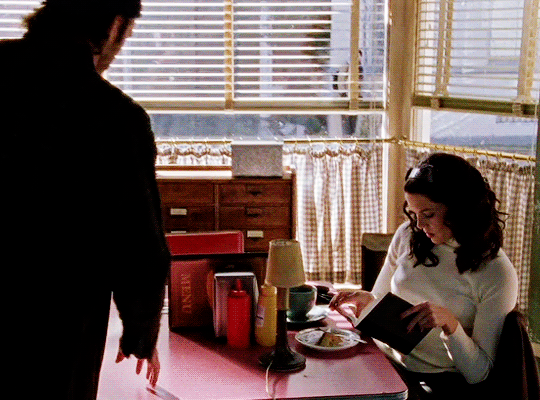
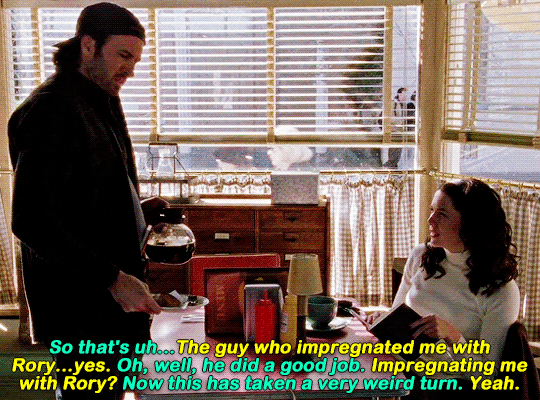

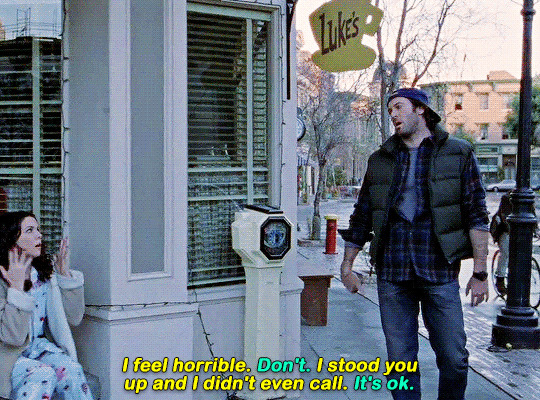
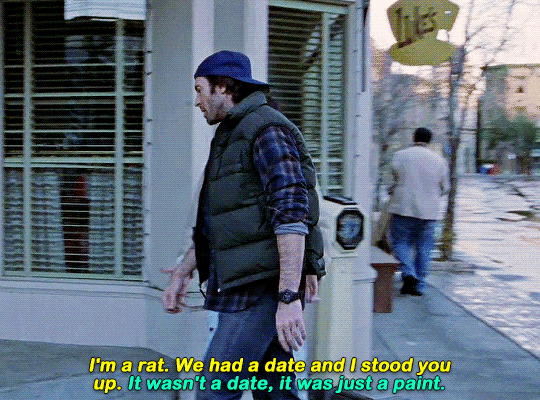
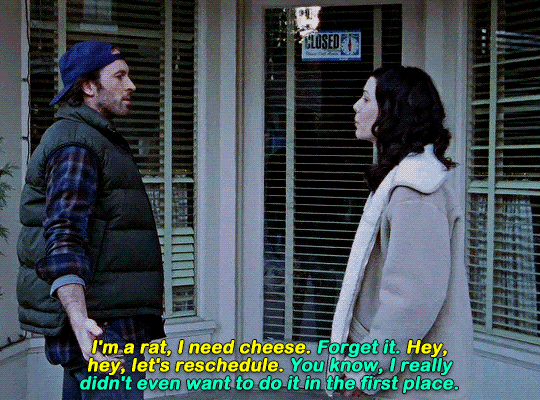
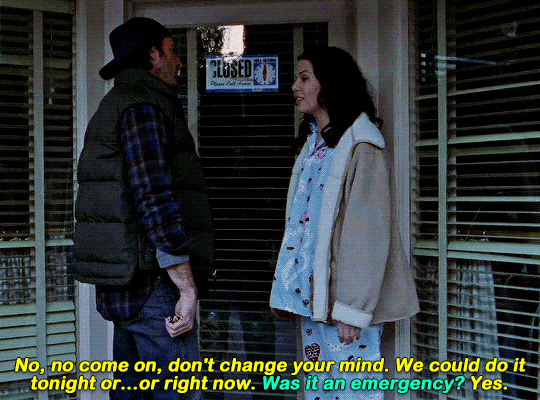
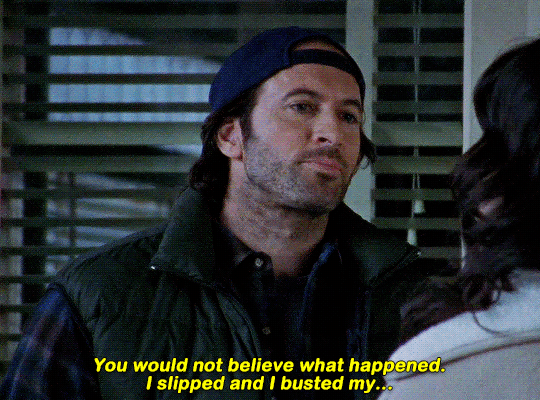
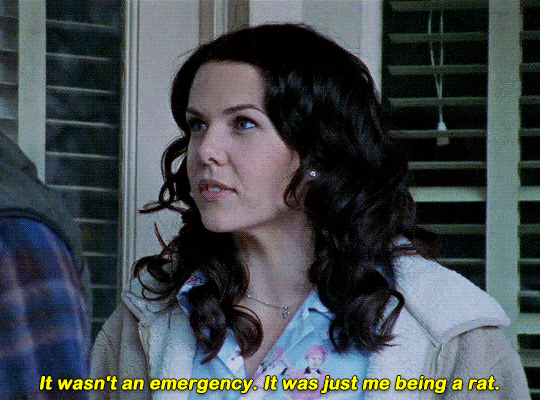
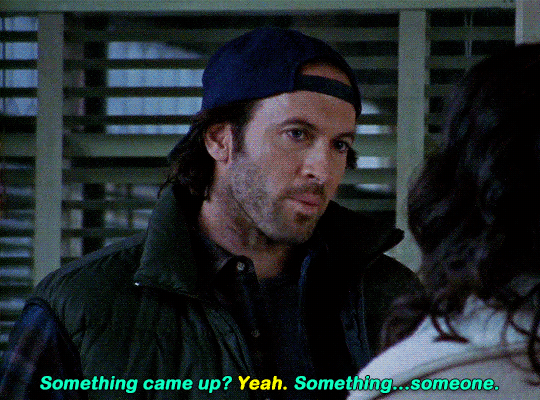
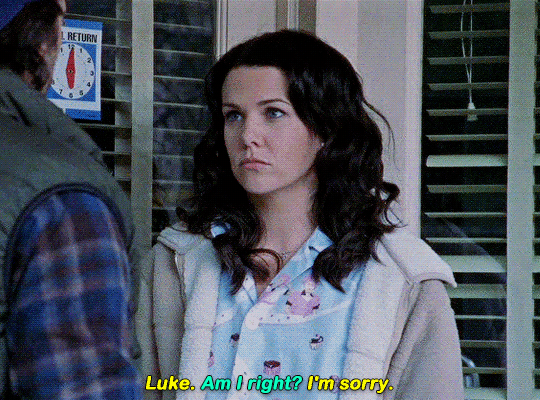
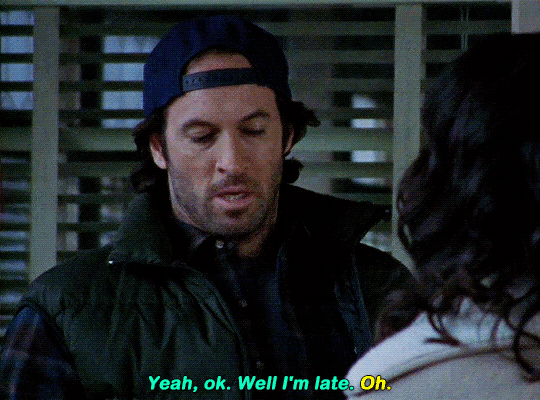

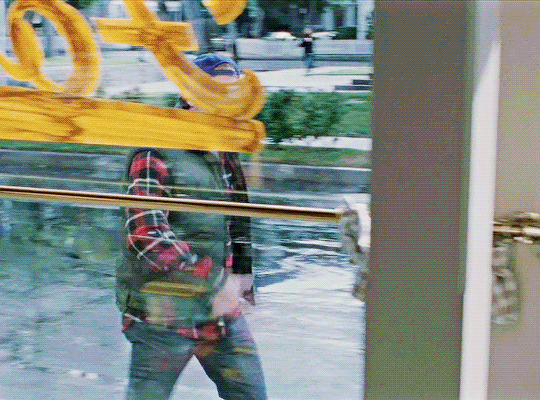
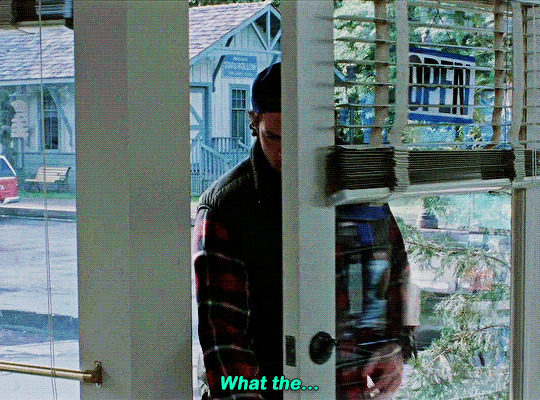
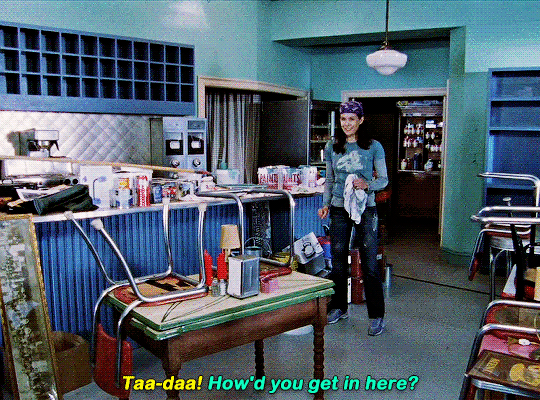
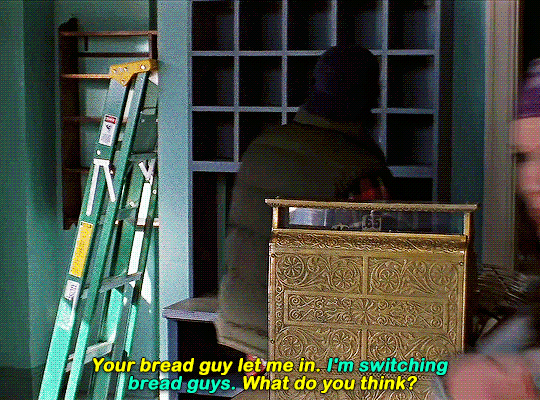
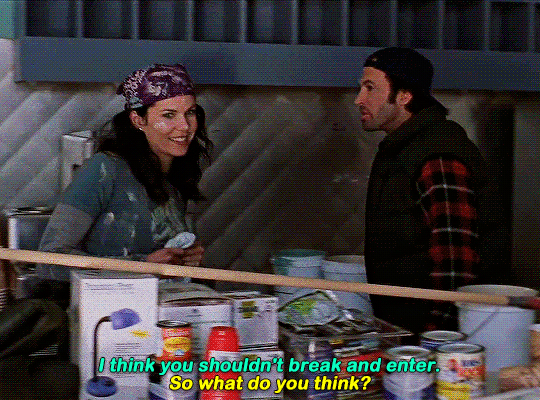
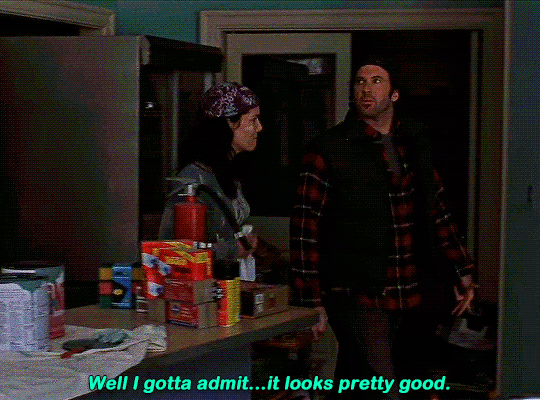
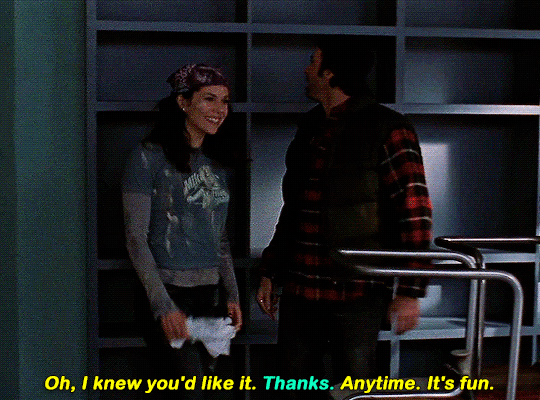
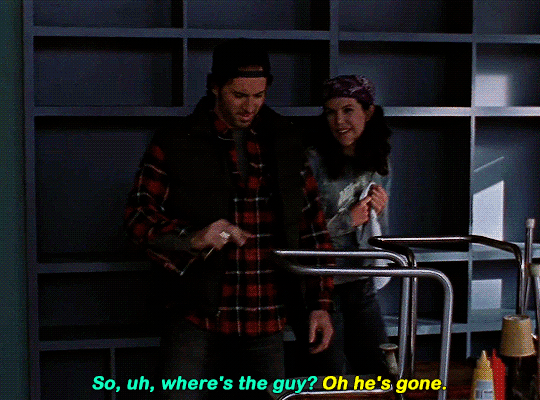

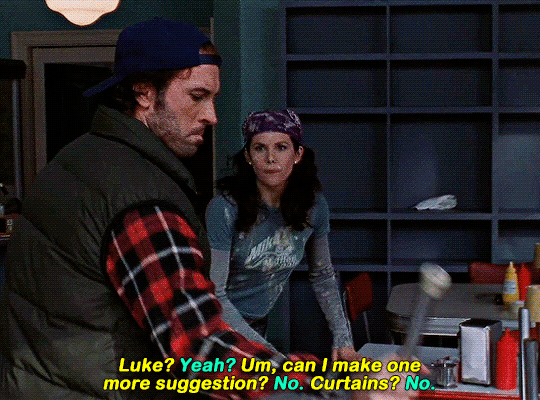
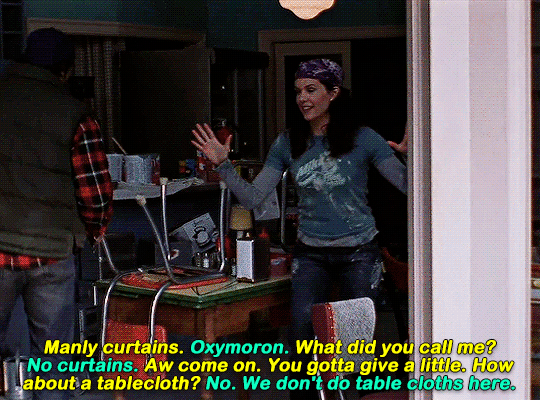
I Am All In Rewatch - Episode 1x15
I thought he lived above the diner, why was he walking in the early morning and opening up the place?...You know, maybe it was an early morning walk...Maybe he was coming from Lorelai's house where he was in the bushes... I thought it worked for the scene for sure...Why is he walking on down the boulevard, keys swinging his keys? [Am I messing this up or was there a scene where you were waiting for her?] At night? [Yeah, outside your own diner.] Yeah, what's that about? That's very dramatic..becuase it gave me the opportunity to act this finality of that moment and sort of go in and give up and lock the door. So that was more important than nosy continuity annoyers. You know... [And how did you feel when you realize she painted the whole place?] He had already figured out that they had done the deed right. She's already told him that.[In not such a direct way. But that was when she was in the pajamas.] He put two and two together. That's a that's a tough one. I mean, yeah, I recall really struggling with it because it's like, and you know, I mean, you talk about being at the bottom of of your feelings, there in a situation. Mean, good God, how devastating that you know he came back and they slept together and he knew it, and it's just...[Yeah, it's rough because it was right as Luke and Lorelai were having that that moment] And then and then he comes in. It's painted or halfway or three quarters painted, and it's maybe all done.... Yeah, I had to play all that stuff. So it's like grief and devastation to acceptance to.. It's like I had to go through the five stages, but it's like in reverse, like, hey, there's there's there's still some hope here, I mean, poor guy...But now he's got to deal with the fact that she she went there with him, you know, so there's that the residual effects of that that are you known, have to clean up that mess because that's going to psychologically be I mean, it's devastating. It'll take a while to get back to you know. Now now I think it puts her on different footing where it's like, okay, you know, this train was going in in the right direction and it stopped and now it's going backwards, and maybe it's the train is taken out of service using a train analogy. I swear I won't use a tunnel. There won't be a tunnel on this analogy. [She says when she's there in the pajamas, we had a date, and Luke says, it wasn't a date, it was it was just a thing.] He's he's downplaying it already. It wasn't ... The walls going up. ...And I also think he's it's like, you know, he's judging. He's being hard on himself too, because like, guy, get in the fight, get in there and get with her, close the deal. What do you know she's moving fast with like all these guys, get in there, you know, be meaningful in her life, be impactful. So it's like it's it's it's yeah, I'm sure he's hurt, but it's I think it's really a wake up call. It's like, this is life and it's moving a little faster. And she's from Hartford and she's a country club chick and you know she wants more than I have. You know that I have to offer maybe, so it's like, get in there and fight for her. -Scott
#i am all in#thank god for transcripts#they say so much stuff#but good in depth stuff anyways#lorelai painting the diner for luke though#my heart#love#luke x lorelai#lorelai x luke#luke danes#lorelai gilmore#lauren graham#scott patterson#gif#gifs#gifset#gilmore girls#1x15#javajunkie
42 notes
·
View notes
Text
I've been rewatching the Noragami anime and Yukine has honestly been through so much it's low key unfair
first there's all the abuse he suffered through in life
he struggles as a shinki because he's 14 (a baby) and at first Yato isn't always the greatest at dealing with him, so he hits rock bottom and has to go through an ablution where he and Yato both almost die (again)
then he makes a shinki friend and he's BRUTALLY MURDERED
he risks his life for Yato and is literally cut in two but miraculously lives to become a hafuri
his master seemingly abandons him but he has to act like everything's fine
His name gets cracked and he has to slowly regain his memories of his painful life.
Kazuma, his mentor and again his closest thing to having a shinki friend, betrays him
He gets locked in the fucking box, essentially reliving the cause of his death.
He thinks he gets abandoned by his master & father figure, again, right as his curiosity about his past life peaks aka his daddy issues are literally at their worst
He gets manipulated and used by both Father and Nora [I am 100000% for Nora redemption and want her to be adopted by Kofuku and Daikoku but I'm also not like uwu she's innocent and has never done anything wrong]
He learns the truth about his past life
He witnessed his best friend (Hiyori) die in front of him.
Can we please please please let my son have fucking peace???? ;__; also the people who complain about how he acts like I'd love you to you be barely a teenager and deal with all this??? like bro
59 notes
·
View notes
Text
Every time I rewatch and Alex says 'no such thing as a locked door when you're a prince, I suppose,' it makes me think about keys and how they're used in relation to Henry in the book vs the movie. In the book, Henry says:
“Funny thing about being a prince—people will give you keys to just about anything if you ask nicely.”
(Which that line from Alex is obviously a nod to)
And it creates this nice juxtaposition between Henry, the prince, who can go anywhere he wants, who has this illusion of freedom, vs Henry the man who is trapped in this life and sees no way out. (Although, by the point that he says this, he’s already starting to see that freedom in Alex.) And I love that! But I also love the changes made in the film. Instead, we get this (paraphrased from memory) exchange:
“You know, I don’t think I’ve ever owned a key in my entire life.”
“No such thing as a locked door when you’re a prince, I suppose.”
“Well… You’d be surprised.”
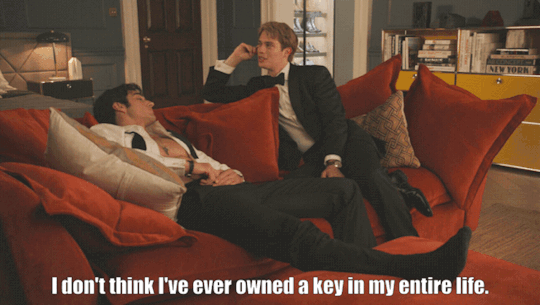
So, here, it's used to emphasise Henry's situation and how he feels trapped in his life—literally without a key to get out. Until Alex. Alex unlocks Henry's life
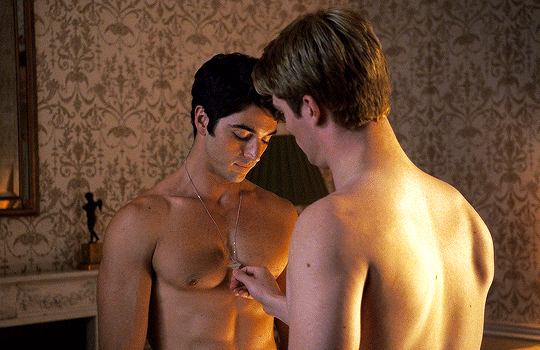
And, so, the symbolism of Alex giving Henry his actual, physical key, after Henry gives him the ring, is strengthened by Henry never having had a key. Like, Alex is literally the key to unlocking Henry from the shackles of his life, to unlocking Henry full stop. Henry has never had a key—metaphorical or literal—until Alex.
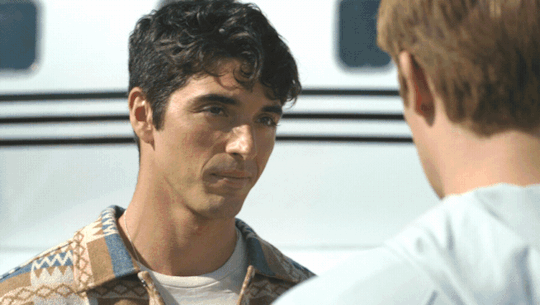
And it's just... It's really lovely, the way it all ties together! That conversation from their first night together, to Alex giving Henry the key, and to him using it to bring Henry into his home, the way it all circles around. And the idea of love setting him free—it does sound kinda corny when you say it like that, I guess, but it's really a beautiful thing. The love he thought he couldn't have, that he initially ran from, is what allows him to be himself. Being queer and loving a man—the parts of himself he thought he’d always have to hide—is what frees him
There’s definitely more to say and I’m not even saying anything new but I was just thinking about it and wanted to ramble a bit even if I’m rambling about very obvious symbolism lol
(As an aside, I do want to mention Henry grabbing that random key from like under the rock, or whatever, as he leads Alex out of Kensington Palace. I mean, I'm sure it's more of a communal key, or something, so it doesn't 'belong' to Henry, and they still have to sneak out under cover of darkness, but it might muddy things a little? I'm not sure. Maybe it fits in because it’s when he’s starting to allow himself to think of the possibility of being open and being with Alex. I do know the idea of, in the universe of the movie, there being a key to the gates for Kensington Palace under a rock right by said gate is so funny to me though)
#red white and royal blue#RWRB#RWRB movie#FirstPrince#maybe they do just have a key lying around idk lol#(it seems unlikely 😜)
100 notes
·
View notes
Text
He Can't Get This
Chapter 1
♡Set in Supernatural S14 Ep14. I recommend rewatching the ep or the crime scene bit ;)♡
~~~~~~~~~~~~~~~~~~~~~~~~~~
"That baby cop, he liked you."
Dean Winchester slammed the door of the impala closed and reached to start her, his jaw tense and lips slightly drawn as he turned the key.
Castiel tilted his head towards the hunter from his passenger seat, a little lost. "I'm sorry, what?" He shifted a little, adjusting his coat as Dean put the car in reverse, voice blunt but unassuming.
They'd just figured out that the Gorgon couldn't sense Castiel and Jack with his eyeball premonitions, for lack of a better description (most likely because they weren't human) So Cas and Jack would have to lead the attack when they tracked down the gorgon again. Whatever Dean had said made no sense to the angel.
Cas' voice was that consistent gruff lull and his hair was stuck up at a little part in the back. Dean practiced restraint for the instinct to reach out and smooth it.
"Mr. Twunk over there," He retorted, throwing a half hazard gesture towards the crime scene. Cas squinted through the windshield and saw a vaguely familiar blond head of hair popping out of a patrol car. The young officer they had spoken to earlier.
"Probably fresh out of academy too." Dean added, his tone short and irritated as he intrigued Cas' full attention, who furrowed his brows and leaned up in his seat.
"Oh, come on," Dean shot Cas a look, "he totally creamed his pants when you pulled the whole 'deep commanding voice thing', he went stiff as a board, don't tell me you didn't notice." He let a soft huff out of the corner of his mouth, his pink lips upturned in a small smirk, though still betrayed by his wound-tight words as he glanced from the road to Castiel.
"I was more focused on the demi god and his victims, Dean." Castiel explained slowly.
"Yeah, sure, not the young guy you got all hot and bothered."
Cas squinted at Dean suspiciously, "Is this merely about your dislike for police officers, Dean? Or is it something else?" He questioned.
Dean forced out a laugh, "It's not anything Cas, just an observation."
"That seems... untrue."
"Yeah." Dean chided, "And what are you gonna do about it?"
Castiel's patience had run thin. "Dean..." he tested firmly.
A blush crept up behind Dean's collar and he gripped onto baby's steering wheel, adjusting his seating, "I just didn't like the way he looked at you, okay, sue me." He threw his hands up for a breif moment before returning them to the sleek black wheel.
Cas titled his head, the line of his jaw catching a fragment of the afternoon sun as they passed by storefronts with big glass windows. "How did he look at me?"
"Like he wanted you to bend him over and fuck him into next week."
"Like how you look at me."
Cas' voice was wet gravel.
Dean halted on the brakes, jolting them forward, scarlet blush deepening, "What, no! You.. you know that's not- and before you say a word about what we did that one time in lebanon that was different okay! I don't gawk at you all the time Cas."
"Different how?" Cas challenged.
The trafic light turned green and a car behind them honked impatiently, "Okay, geez," Dean muttered as they started moving. "Because... I was super horny and hadn't seen you in what, four months?" he continued, "And you're my best friend dude and you were looking particularly moody that day and yeah, maybe I'm just jealous and a little bitch." He sighed, defeated.
Cas let out a low chuckle.
"Oh shut up you smug fuck," Dean reached out and shoved a hand over Castiels face, his own now a particular shade of pink.
Cas cleared his throat and picked up a level tone as Dean's hand fell away, "You know you can always ask to..."
"Oh yeah, I know," Dean interjected, "Just check in between hunts and saving the world and having Micheal locked up in my head and raising our kid to be like 'oh Cas,' I miss the feel of my skin against yours and how you make me act like a dumb teenager and that night in the cowboy hotel was the best of my life and I can't get you off my mind every time you leave. I got Sammy breathing down my neck constantly cause he knows and just wants to rub it in my face but I won't say anything because I refuse to talk about feelings with a sasquatch or like you know ever and I-." Dean's words started out sarcastic and ended with a desperate pout and Cas gave him a kind look, reaching to rest his hand gingerly on Dean’s thigh as the hunter let out a heavy exhale.
Cas knew life was never easy, for any of them, but Dean was the most important thing to him, no matter how closed off or stubborn he could be.
"So, you got jealous when a man looked at me with sexual intentions?"
"Cas, you're making me sound like a little bitch again." Dean huffed, the peachy blush crowding against his freckles a complete contrast with his deep manly tone and set, sloping jawline.
"My apologies, Dean." Cas stated, his eyes soft, "I wanted to know what was going on, and that only works when you tell me."
"I know, I know." Dean exhaled, "You know I'm not good at this stuff Cas, but I have missed you.. All this running around.. 'drives me crazy sometimes." Dean nodded his head down and looked up at the road through his eyelashes.
Cas silently noticed how after all these years Dean still seemed to physically shrink in on himself a little, anytime he showed vulnerability. Or rather, he wondered with disdain, who exactly had taught him this trait. The only time he seemed to release himself from those instincts is when he let Castiel have him in bed. And oh, how beautiful Dean was then. Bare and trembling under his hands. Never trying to be smaller.
"I've missed you too, Dean." He comforted, knowing no words could come to match how he felt being so often pulled from the man. He looked out the passenger window, watching the landscape slide by, "You know-" he thought aloud, an idea still churning in his mind, "Rowena still needs time to prepare the tracking spell.." He lowered his voice and gave Dean's thigh a gentle squeeze.
Dean swallowed and tensed his hands around the steering wheel, seeming much more determined to get to where they were going.
#destiel fanfic#destiel#spn fanfic#supernatural fanfic#mixed pov#jealous dean winchester#jack kline#sam winchester#gorgon#rowena macleod#my fic#leo writes#chapter 1#multiple chapters#spn#superntural#castiel#dean winchester#drabble
54 notes
·
View notes
Note
Hi. I'm someone who has been planning to rewatch Digimon Frontiers. I remember watching it as a kid, but hoping to rewatch it as an adult to see how it still holds up. Before that though, I've been wondering about how that series has treated Izumi in light of a lot of the fandom's complaints about her.
I've only watched the American English dub, but I am wondering about why she was written as she was and how it differs from the Japanese version. I also saw your meta on the writers for her episodes, honestly surprised that her episodes were written by female writers.
I can use your perspective on why she was written that way since you seem more knowledgeable about the franchise as a whole.
I'm also curious how much romance has actually been a thing in the Digimon franchise, or if it is mainly just a small subplot that's usually kept in the back.
I appreciate any information you can give.
Hello! Thank you for dropping by!
Regarding Frontier and Izumi, to be honest, I don't really think there are too many substantial differences between the American English dub and original Japanese version to the point I could make any in-depth analysis. (There are changes, but it's in a very vague blanket realm of "the insults and bantering are a little harsher", and it's definitely not Adventure or 02 level.) The Japanese version has the infamous "Sexy Dynamite" frame, so one might argue that it was even worse about it, but small details aside, I think the good points and the complaints you could make are pretty much the same.
As for why the writing around Izumi is so glaring compared to prior (and perhaps most other) Digimon series, I honestly can't say. As far as female creator presence in the main staff room goes, as you mentioned, Izumi's key episodes were by female writers, and Seki was still producer. And on top of that, while Tomita fully admitted that he had a hard time writing girls, I honestly can't believe that's the (sole?) cause of it when I look at his other portfolio works, including some fan-favorite episodes of Sailor Moon and, in general, some magical girl series with excellent female characters.
Perhaps it's the fact that it's the first Digimon anime series to not have any involvement from Yoshimura Genki (who was responsible for most of the writing around Ruki in Tamers and is currently known as a hardcore feminist), or perhaps Bandai panicking about the franchise's poor sales made them lock down harder on "we need to Please the Boys" (something that does sometimes end up in being neglectful of female characters), or perhaps the fact that Izumi was the only girl in the core group made them more inclined to treat her like the Designated Girl Character™ of the series...but this is all speculation, and your guess is as good as mine, especially since we have so little information on Frontier's production compared to others.
As for the question on romance, it's pretty much always been a subplot at best, most likely because the majority of major human characters in the franchise are elementary to middle school age and are thus way too young to be considering "serious" romance or relationships (middle school being probably the youngest you can push the limit as treating a relationship as "serious" instead of just being a puppy crush). Moreover, Adventure and 02 seemed to take the stance of "romance is a part of one's life, but not the most important thing in one's life" (something that seems to have frustrated a lot of fans regarding the series not caring enough about shipping), so even stuff related to Yamato and Sora is carefully squared off to the side like it's not anyone's business. As much as I like to make ship-related jokes, if asked in a serious context, I personally never believed that most of anyone's behavior towards anyone in Adventure or 02 had legitimate romantic sentiment behind it, mostly because they were too young for it; even Daisuke's crush on Hikari comes off to me as him being clingy because she's cute and not really taking the time to think about what the next steps would entail.
Other than Yamato and Sora, putting one-sided humorous crushes aside, the closest to explicit depictions of (human) romance that actually seem plot-relevant would probably be Takato and Juri in Tamers, which even then is not really that explicit (although the people involved in its creation love to talk about it like it's a sort of damsel-in-distress plot), and Kiriha and Nene in the Xros Wars manga, which also is prominent and related to the plot but also not that big of an element in it. Sometimes it seems like it's milking the concept of romance more than it's usually done in practice (an episode of Savers is styled like it's Yoshino having a love story with a childhood friend, but if you actually watch the episode it's at most just her having mixed feelings about a childhood friend falling from grace). So it's honestly been a series that's hands-off with romance for the most part, with most of the shipping and romance-related content being on the part of the fans.
By the way, the official reason there's no explicit depiction of Yamato and Sora in Kizuna (despite them being a known endgame canon couple) is that it would have been overly conspicuous and obstructive in a movie that only had 90 minutes to tell its story. (I know there are a lot of people who think the real reason is "because it was controversial and they don't want to get people mad," but personally, I feel that if they were worrying about controversy, they wouldn't have given Kizuna such a controversial premise in the first place!) So I imagine that's the main reason we've gotten so little romance; it's exactly because it's such a crowd-pleaser and overly conspicuous element that they want to avoid it, because Digimon is frankly a complex franchise with a lot of expectations and mechanics that it needs to worry more about, and it's hard to cram a prominent romance plot in there in a way that would be tonally appropriate.
52 notes
·
View notes
Note
What is/are your favourite Sam/Tara moments?
You sent me this a while ago, and it's not the only one I've gotten asking me this. It took so long because I used it as an excuse to rewatch 5 and 6, multiple times.
This was so so so hard because like, all of them, obviously. So, I've tried to narrow it down. I've picked one little/subtle moment and 1 big moment in each movie for both characters and then for them together.
5 Tara: The end of the confession scene in the hospital: the way Tara watches Sam leave, the way she looks slightly shocked that she does and the way she takes a deep breath once the door closes. / The entire hospital 'anti-chase' scene. It was just incredible. I really really love it. The way Tara is in so much pain but she keeps trying anyway, she's determined, and even once Ghostface pulls the wheelchair away she keeps crawling. And we get the "I'll make sure to hit all the organs I missed last time." "Fuck you." This is actually my favourite scene in the whole movie. / Also honourable mention clotheslining Amber with the crutch.
5 Sam: The way when Tara tells Sam she wants her to stay and Sam immediately starts nodding. / Cocky Sam "Guess you're not as persuasive as you thought" and the phone ringing "That's for you." / And of course, her Richie stabathon.
5 Sam & Tara: Idk if this counts or if it's individual but the way when Sam goes "No, we're leaving. That's the only way I can protect Tara." and we pan to Tara's face and it's like she's realising something and it has to be directly linked to her heavy breathing in the next scene and her looking for her inhaler. / ALSO the way they stumble into each other's arms after Tara shoots Amber, the way they're both crying and shaky (also the way Tara side-eyes Amber's body while they hug 👀 before closing her eyes and hiding her face in Sam's shoulder). / "You're not going anywhere without me. Don't worry, I'm gonna hold your hand all the way there."
6 was actually so much harder to narrow down scenes for because we get so much more.
6 Tara: Tara is constantly looking towards Sam the entire movie. I've seen a lot of jokes about her side-eying her, but she's doing it because she's looking for cues on how to respond or what to do from Sam. / The Kirby conversation. I've mentioned it so much, you all know how much I love it. / Honourable mention, obviously, the Gale punch, and how she's feeling protective of Sam and lashing out, physically and verbally (and also, notice how the reporters are mostly calling out at Tara, and the "Tara, do you feel safe around your sister").
6 Sam: The way Sam sees the police lights and presence and it instantly fills her with anxiety and so she calls Tara - because Tara calms her down - and we get the "You know you're supposed to pick up when I call", and Sam goes on to try and make plans with Tara because she's had a bad therapy session and being with her sister will help her feel better. / ALSO this is just such a small thing but the number of locks on their apartment door. / The way whenever things feel hopeless or dark, she lets Tara pull her away from it.
6 Sam & Tara: The way Tara refuses to let Sam go alone to the police station even though she blew up at her TWICE in like the past hour, and then the way she bumps into Sam as she's trying to listen to the phone call, as they're on the way to the police station. / The whole stealing a police car thing, Sam winding the window up and going "shall we use the sirens?" and Tara being like of course. (side note were the keys just like just in the car? that's not very safe.)
Obviously just... the entire third act. The way they protect each other while they're being circled by the Ghostfaces, the "you have to let me go", Tara stabbing Ethan, Sam's "looks like you're down another brother", the whole Ghostfacing Bailey, the way Tara gives Sam permission to end it and the way she watches, the conversation on the stage.
Also there's such a comparison to be drawn between the soft way Sam whispers "here it comes" to Richie before she slices his throat, and Tara's "now die a fucking virgin" after stabbing him in the mouth.
#/mp#ask box#Scream#Sam Carpenter#Tara Carpenter#-notes#anyway not to foreshadow but Ghostface telling Sam “for a mastermind you're not very bright”#well that's because she's the muscle. but who else do we know that is clever and likes to make plans 👀 /jk#ALSO don't think I didn't love the 2 Sam & Tara arguments and the 2 Sam emotional 'core 4' scenes because I did#but I'm TRYING to narrow things down
60 notes
·
View notes
Note
alright, so this is a question about netflix series which i've recently watched and now i'm suffering from asoue brainrot. there is an obscure moment in the penultimate peril (s3ep6) where frank locks olaf in the closet before the trial, and just as frank is about to close the door, olaf says, "one last thing", as if intending to say something. what do you think he wanted to add? is it something that is maybe more clear in the books?
OKAY so after rewatching that scene (several times) and rereading the corresponding scene in the book, I now feel at least partially equipped to answer this question! (But please bear with me because my research did send me on a bit of a tangent)
So first off, I don't think dealing with the book scene will be of too much help here (although not entirely unhelpful, either), because, as much as I love the netflix adaptation—and I do wholeheartedly adore it—it changes so much that the comparable scene is functionally unrecognisable in several key aspects. The main one being the lack of hostility towards to Baudelaires—Olaf is solidly isolated and supposedly running out of options at this point in the show, whereas his mentality in the books is entirely different because things appear to be going much more his way. He has a crowd at his back and the Baudelaires are seen as far more guilty, which doesn't really translate into the show!verse at all.
So, if we're looking at the show from a more isolated standpoint, I had to consider the possibility that it was a deliberate "what if" moment, without having anything else planned to say, purely for the purpose of getting in the Baudelaires' heads. However, I do feel like the most likely answer is that Olaf did in fact believe he would be heard out, so that's what we'll be assuming from here on out.
The fact that the Denouement in question calls him "buddy" and yet treats him roughly could have made him believe that this is Ernest playing the long con—pretending to be an ally to the others because they were outnumbered at the time, or simply for his own ends. However, he could also genuinely believe that it's Frank, and that he'd be heard out because it's the "noble" thing to do—VFD and the general society in the snicketverse is routinely governed by politeness over logic, and so cutting him off is simply impolite, so he may have believed he'd be able to talk his way out of being locked up. The use of "buddy" could be a generic, positive moniker used by Frank, or a genuine sentiment expressed by Ernest; the rough shake of his arm could be simply how Ernest behaves on any given day, or genuine righteous anger from Frank—just as it's impossible for us as the audience to be sure, Olaf has to try and figure this out in mere moments.
Regardless of what he thought would happen or who he thought he was talking to, though, I have to believe that whatever he was going to say would have been targeted more at the Baudelaires than the Denouement currently getting in his way, so it would likely have been an extension of what he'd already said, and what he'd go on to say at key moments for the remainder of the series—another attack on the Baudelaire parents, a critique of VFD's intentions, or something equally ambiguous to sow the seeds of mistrust in the minds of the children. Despite his general demeanour, he is actually a terrifyingly capable villain, and the human embodiment of the "either I'm god, or truth is relative" soundbite. If he's allowed to talk for long enough, he can convince just about anyone of anything (which is exactly what happens when he takes the stand during the trial), and I wouldn't be surprised if he was expecting to be allowed to run his mouth until both the adults are on his side.
What I think is a very interesting point to consider, though, is one useful comparison from the books—the number of the room he's sent to. As we all know, the rooms in the Hotel Denouement are arranged according to the Dewey Decimal System, and people are categorised above just as the records are categorised below. In the book, the Baudelaires are confined to room 121, and Olaf is locked in room 165 to await their trial. In the Dewey Decimal System, 121 refers to Epistemology—the theory of knowledge. A quote taken from the wikipedia page for epistemology reads:
Epistemology asks questions such as: "What is knowledge?", "How is knowledge acquired?", and "What do people know?"
Having the Baudelaires placed here shows that they aren't sure what people know about them, or what will be revealed at the trial, or what will happen to them (as clearly illustrated by the their conversation at the end of chapter ten). Olaf, however, is placed in room 165: Fallacies and Sources of Error. This could imply that he's in the wrong, but perhaps more likely foreshadows that other people are wrong about him. He will not go to prison, he will not be convicted, and, perhaps most crucially, he is not as completely evil as the Baudelaires believe. He has done terrible things, and he is a terrible person, but—as discussed during The End—they are wrong about the most crucial of his evil deeds (to them). Because he didn't kill their parents. He represents everything that VFD pretends it isn't, but at this point the Baudelaires believe (and have been told) that he is the complete antithesis of what the Volunteers represent—and so, he is categorised as a source of error.
However, in the show, both parties are placed in entirely different rooms, and therefore entirely different categorisations. The Baudelaires are placed in room 342: Constitutional and Administitive Law. This is a choice I absolutely adore, because at this point in the narrative they are quite literally trapped in bureaucracy. They fail because the system is rigged, and they are literally imprisoned by the law—not in the sense that they have already been convicted, but in the sense that they will be no matter what they do. If they stay, the High Court will pronounce them guilty. But, when they run, they're supposedly only proving their own guilt—damned if they don't, and damned if they do.
Olaf's is perhaps the more interesting change, though, because he's no longer seen as a source of error—despite the claims he makes about the Baudelaire parents and VFD immediately before being locked up (once again implying that he isn't lying to them, just using convenient truths). And it carries through to the trial, because he uses the truth (albeit a very deliberately and pointedly edited version) to make the Baudelaires seem just as guilty as he is. In the show, he's placed in room 170: Ethics (moral philosophy). And he is given the chance to talk at the trial, and talk he does. He twists the truth, spins it so that the Baudelaires seem guilty, but that is the exact point of moral debate! He trolley-problemed his way into screwing with the Baudelaires' heads, not because he needed to (he knew he was never getting convicted, because he knew who was on the High Court), but to prove a goddamn point. Yes, he's done terrible things, but did anyone think to ask him why? Of course, to us, the reader, the viewer, the third party observer, it doesn't matter. Because at a certain point, actions speak for themselves. Reasons can explain, but not necessarily excuse—that is the reasonable stance to take, and no matter his reasons, the explanation will never be an excuse for him.
But he's an actor. That's why Klaus calls him up to the stand in the trial, because he knows he'll want to talk in front of an audience, and can't imagine any way he wouldn't incriminate himself. And despite the Baudelaires' personal opinions of his ability, we've seen time and time again that he must be a good actor, because people always believe his performances. And as any good actor could tell you, it's crucial to be able to read your audience. If you want the best reaction, then you need to work out, as quickly as humanly possible, how they'll respond, and play up or tone down your performance accordingly. And he's spent so much time with VFD, with the Baudelaires, that he knows just what to say. He knows that, regardless of their reasons, they will feel guilty—in both the book and the show, they question if they're not just as bad as him! They did what they did to survive, and they genuinely worry that they're the same as the murderous, fortune-hungry beast that's been hunting them through their grief and fear. And he knows that. He wants to get in their heads, maybe just for fun, but mostly to get them to come to him. And the worst part is that it bloody works! They end up escaping with him, burning the hotel and potentially letting him out into the world, turning away from the good-hearted people trying to help them because if they can't trust anyone to be on their side, at least they can trust him not to be.
All this to say that, looking at his character, the writing of the show and the way the events unfold, while I can't give you a verbatim quote of what I think he would have said, I will say this: I wholeheartedly believe it would have been a short, targeted line to the Baudelaires, attacking them, their belief system, their very moral character. Because he didn't know he'd be allowed to speak at the trial—remember, it was only Klaus' fear and paranoia that put him on the stand in the first place—and as far as he knew, that could have been his last chance to ensure they'd come to him. He wasn't sure his previous words had been enough, and we all know he has a flair for the dramatic. Think back to one of the most chilling moments of the entire series, both in the book and show, at the end of the Bad Beginning. When the lights go out and he makes his escape, the Baudelaires would have still lived in fear of him, knowing he was on the loose, but that wasn't enough. He risked capture, risked losing his window of escape, all to torment Violet one last time; to plant that final seed of paranoia and fear into her mind, to whisper threats in the dark. And I have no doubt that, had he been given the chance, that is precisely what he would have done here.
By cutting him off, the Denouement gave the Baudelaires hope; hope that it might be different, hope that people wouldn't listen to him this time. But after all they'd been through, they couldn't risk not letting him talk—everyone always listens to him, in the end, and they had to make sure that everyone would finally believe them instead. And that very act of cutting him off, of not letting him give that final threat, is perhaps what sealed their fates. If Olaf's threat was fresh in their minds, they might have been too fearful to address him. If, like in the books, he'd eluded to his acquaintance with the High Court, they might have known what would happen. But he didn't get the chance, and neither did they.
#very fascinating dialogue#count olaf#asoue#asoue analysis#the penultimate peril#Various Fastidious Dissections#also THANK YOU FOR SENDING THIS#had so much fun thinking about it#got a little bit sidetracked#but i hope this at least somewhat answers your question!!#please feel free to send another ask if it doesn't#or for anything else#i've missed dissecting this series#also hello! welcome to the brainrot!!#a queue of unfortunate events
11 notes
·
View notes
Text
Byler Getting Murray'd: Inevitable?
I never really humored the possibility of Will and Mike getting Murray'd at Murray's house, but recently I realized something...
When it comes to the whole lovers curse Murray has going on, both jancy and jopper were confronted directly at Murray's place, alone (granted jopper had Alexei present, but he couldn’t speak English).


I'm not saying that Will and Mike would even for sure be alone, but I still think that it's very likely they will be 2 of the few (or many) who end up residing there at some point during season 5. (I also think it's likely we'll get a parallel shot similar to these two above, but involving Will and Mike).
Before I get into this, I urge you to check out this post first! It analyzes scenes from 2x05 when Jonathon and Nancy visited Murray's and how a lot of the details in those scenes, as well as the dialogue itself, foreshadowed endgame byler.
While I do have separate evidence below, for why byler could end up at Murray’s in s5, I still think that the Duffers leaving all those hints back then in 2x05, only to have byler themselves, on the literal cusp of coming to terms with their mutual feelings, ending up in that very setting in s5, would be pretty epic.
But basically, why I think this is all very likely is because Murray’s house isn't even a house, it's a warehouse. It was designed by a literal conspiracy theorist, aka a perfect safe house for the apocalypse.
Of the scenes we get at Murray's warehouse over the seasons, there's a focus on the remoteness of it, as well as it the safety it provides having numerous locks, security cameras, a rifle right next to the door, etc..
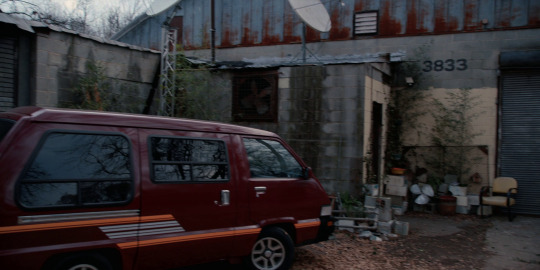
(We even get a glimpse of it in s4, when Murray is taking an ice bath post-karate practice...)
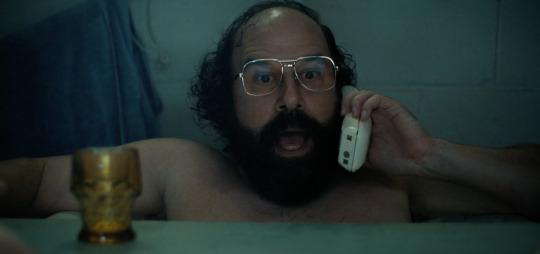
It's very likely Hopper's cabin won't be enough room for everyone, or maybe even anyone for very long, as it's not exactly safe long-term. While there's other places that are a possibility when it comes to locations in s5, Murray's warehouse is arguably the most fit for this upcoming storyline, meaning it's very likely it will be one of the main locations for the final season.
Why else would they have put so much emphasis on his house and all that comes with it, if they had no intention of circling back to it?
Also, why wasn't Murray with them upon their return to Hawkins at the end of s4? Well, probably because his warehouse is the only place he wants to be right now, and understandably so. Odds are that’s exactly where he’ll be waiting for our mains at the start of s5.
But it gets even better. Upon going back and rewatching the show recently, I noticed that in 3x08, there's a scene where they're planning for the kids to go to Murray's to hide-out. We get him literally handing over the keys to Jonathon and Nancy, explaining each individual key they'll need to get in (the keys are blue and yellow or whatever).
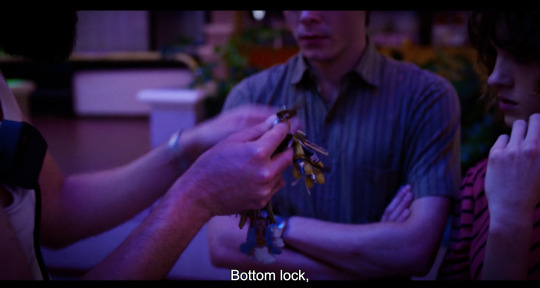
Then we get a scene directly afterwards, of Joyce explaining to Will that he will be safe there.

We can only theorize right now, but it's possible apocalypse-byler could end up alone at Murray's hiding out, seeing as that’s the trend thus far (mostly) with Murray's lovers curse on jancy and jopper. Also the ending of s4 seemed to emphasize on byler being side by side and sort of on their own at times, which could have been foreshadowing for their dynamic in s5.
But again, considering how safe of an option Murray's place is in general, I think that it's likely the other kids would come too. Maybe they would just follow through with their original plan at the end of s3, before the mind-flayer barged in and messed it all up. Maybe, again the parents will make attempts for the kids to not be involved initially, and so they'll ship them off to Murray's (though they'll inevitably rebel I presume).
I am curious about how it would play out with Murray though. I'm sort of in the middle on the spectrum, where idk if I even really want byler to be murray'd, while at the same time it's literally all I want...
Though I should admit regardless of what I want, the story is telling us that it’s inevitable...
I just don't know how it would go down. Would Murray go about it the same way he did with jancy and jopper and just tell them to cut the bs, or would it be more complex? I'm hoping the latter, but also with a twist that manages to somehow match his previous pattern in a way, because having it come full circle with parallels between all three pairings would just make it that much more amazing to watch and rewatch.
#byler#stranger things#stranger things meta#stranger things theory#byler analysis#BTW this is in no way shape or form me trying to plant the idea of byler getting murray'd at murray's in bylers heads#so that it becomes a trend on byler fics set during s5 here on out...#no ulterior motives whatsoever...#*me when i lie*#byler theory#byler proof#stranger things 5
186 notes
·
View notes
Note
okay I just thought about a theory and I can't confirm the plausibility of it until I can rewatch the episode but I really need to get it out of my system, please tell me what you think about it
so first, this kinda works on a "trust me bro" starting point but basically this come from the fact that I'm like 75% sure that Alastor, Husk and Niffty are the avatar(s) of the Root of Evil, or at the very last that they have to business with it (likely Alastor is the one who made the deal and brought Husk and Niffty along but they're all in it)
I think the Root of Evil doesn't have a body, and may have granted Alastor powers in exchange to become its avatar, oooor its pawn, but I'm willing to bet being able to possess his body is part of the deal
but if his deal grant him power (and not, on the opposite idea, restrict them), why does his breakdown in ep 8 suggest that it's this very deal that almost got him killed?
and I'm here, wondering, was it really Alastor who fought Adam?
I think not avatar, but I did hc that Alastor made a deal with Roo when he was alive. That's why when Alastor arrived in Hell he was already powerful, taking strong Overlords down.
Alastor's powers are red and Roo, who boosted his powers, colors it with green. That's why the radio broadcast is green.
She is trapped and chaos lets her locks get loose. And Alastor is supposed to help with it.
There was a theory that Roo acted more like the devil that tempts people into sin. Alastor was one of them(well not tempted but a pawn to use). And he was too arrogant to think he can use this deal for himself. Maybe in time he regretted it and wanted an out. And for this Roo restricted his powers, and this is why Alastor disappeared and now can't be on his top again.
(I low-key like to hc Lilith works for a way to defend Hell and defeat Roo as her chaos will be dangerous for Hell as well, but Heaven isn't trustworthy to work together(which still works for Roo). So sinners(and Eve) it is.)
9 notes
·
View notes
Note
Do you have top favorite character (or characters, if you feel like listing multiple) of all time from any media (animanga, tv series/cartoon/movies, books, etc)? Why love them?
Late reply cuz I kinda forgot abt this one hahah (٥↼_↼)
But oh do I have a LOT of them.
Starting off...
Bakugou Katsuki and Izuku Midoriya (MHA): they're amazing as a ship in their own right but as characters their both so deep and interesting with many layers and nuances interlaced between them.
Mikage Reo (Blue Lock): aside from easily getting attached to characters the fandom hates for no legit reason *coughs in Bakugou and Takemichi* he's literally the most perfect, precious cutie patootie. Not only that he's WIFE MATERIAL which is something instantly found attractive about him, the things I think about OMG (๑♡⌓♡๑)
Dante (Devil May Cry): I was fifteen and he was the coolest video game character I ever saw. Couldn't tell you which of the games tho, only watched and commented while my brother played. I did watch a few episodes of the anime but it's been so long I don't remember if I liked or hated it.
Ryomen Sukuna (Jujutsu Kaisen): We love a chaotic king, like yasss bitch, kill those innocent civilians yayyy!!!
Draco Malfoy (Harry Potter): Blond and bitchy just the way I like em.
Sano Manjiro (Tokyo Revengers): How are you the best fighter but oozing such bratty bottoms energy I love him!!!
Tyki Mikk (D.gray Man): He's a keeper when he can literally reach into your chest to stop your heart, sorry I don't make the rules (^^)
Kuroko Tetsuya (Kuroko no Basket): I'm rewatching the anime and why is he low-key so funny??? Aside from that drama just follows him constantly and I'm so down that.
Sung Jinwoo (Solo Leveling): Daddy and babygirl. The ultimate combo.
Ash Lynx (Banana Fish): *bursts into tears*
Yato and Yukine (Noragami): They're the only reason I considered picking up the manga when I realized there was probably no third season coming. Like I need to know how they're doing but I'm so lazy. They bounce off each other so well and I don't think I can like one without the other.
Lu Guang (Link Click): he came back in time for his boyfriend?!??! Season 3 where are you?!?!! (〒﹏〒)
Benimaru (Reincarnated as a Slime): Red haired, ogre Daddy.
Chloe Decker (Lucifer): I have a problem liking female characters cuz many of them rarely stick with me but I love her, she's cool, and in my honest opinion very well written.
Kaburagl T. Kotetsu aka Tiger (Tiger and Bunny): We stan single fathers with washed up energy. All he needs is a tall, blond brat to push his buttons.
Natsusa Yuzuki (Number 24): He's so sassy and dramatic I need him as my bestie ASAP. All that while having the whole cast wrapped around his fingers, truly the embodiment of gaslight, gatekeep, girlboss. I don't care if you disagree.
Lloyd Frontera (Greatest Estate Developer): The only taskmaster I'd willingly serve, they call him ugly I call him 'Sir'. Maniac???where?? All I see is a man trying to get his bag and be happy.
But that's all from me babes, those are all the characters I can think of off the top of my head. Mainly got to this cuz I don't think I'll make any real fan or shipping post this cuz I've got art and deadlines to attend to. Hoped anon likes my answers and I'll get to answer more questions like this.
#writeblr#fandom#favorite characters#anon ask#fanfiction#anime#jjk#mha#ao3 struggles#bllk#boy's love
6 notes
·
View notes
Text
Projects I'm working on or am actively planning:
Red red red, why am I not dead? ch.7 (Carrion)
Started
Finished the first chunk of the chapter (everything leading up to perspective change). Having some difficulties deciding if I should scrap some scenes that were supposed to happen before the end of chapter 6 (changed order for better pacing), or try to rework them into it. Also dealing with the fact I've had to go wildly "off-script" since some stuff the original to doesn't fit with the fic retelling/doesn't make sense imo.
Out of your depth (Subnautica)
At least 70% done
Same Subnautica fanfic I was working on before, just changed the title. Old concept that's been a brainworm for years, that I've been slowly chipping away at. Nicknaming it the Transfuser AU. Getting close to the end of fic, just currently trying to write a high action scene while making sure what happens both makes sense and is easy for the reader to follow.
Your Coworker is a monster ch.4 (FNAF)
Started
Accidentally forgot this existed (thanks ADHD, very cool) until someone recently left a comment on it. Currently trying to figure out the pacing for the next chapter (how much should happen without ruining the pacing or making it boring), as well as planning how to pace the rest of the fic. (I am not the best at pacing long fics/not very good at slow builds so please pray for me 😭)
Nightmares do come true [title not final] (BATIM/BATDR)
40-60% done
Also accidentally forgot this existed (thanks ADHD, very cool). Sequel to Keep your friends close, and your demons closer. Got stuck forever ago and then unintentionally abandoned it. Despite not leaving any notes to self, managed to recall a bunch of my plans while ranting to friends about having not left notes for future me. Replaying/rewatching bits of the game to try and make sure I don't make them ooc before I start writing again.
The Graveyard Shift ch.3 (FNAF)
Still in editing/art piece not started
Massive roleplay I did with my partner being converted into a fanfic. While everything is technically already written, still in the process of editing the next chapter-sized chunk into fanfic material. Currently dealing with rewriting a scene that is inconsistent with things later established in the story, and with it also trying to fix a plothole that comes up multiple times throughout the story.
Are you one of us? [title not final] (Pizza Tower)
Planning
One of the fics from the poll of Pizza Tower fic ideas (Peppino loses the boss battle chase and gets adopted by the clones). Probably the most likely to be finished out of the remaining 3, but I've put it on the backburner in favor of working on the above.
My cell can fit two [title not final] (Pizza Tower)
Planning
Another more dark leaning fic (like Peppino's Day Off, but probably darker?). Without spoiling too much, Fake is locked in their boss room, and has been horribly mistreated. Peppino enters to retrieve the key, but is then locked inside until he finds said key. Peppino is forced to deal with the mistreated Fake whether he wants to or not, trapped inside with them. Also on backburner in favor of working on above fics.
#progress#been a long time since I've done this#fanfic#ao3#carrion game#fnaf#subnautica#batdr#pizza tower
15 notes
·
View notes
Text
tagged by @baynton 💖💖💖
Tag someone you want to know AND/OR some of your besties
Favorite color: purple >:^)
Last song: spooky hoe by danny gonzalez
Last movie: scooby doo 2 monsters unleashed (rewatched. still a masterpiece.)
Currently watching: chainsaw man, what we do in the shadows, the wrong mans (rewatching. again.), bbc ghosts (very slowly watching season 5 bc i'm a baby) and keeping up with ofmd
Other stuff I watched this year: basically every mat show, pushing daisies, our flag means death & shelter
Shows I dropped this year/didn't finish: the witcher, locke and key, in the dark, inventing anna, 9-1-1, 9-1-1: lone star. and i still haven't watched the finale of the owl house because, at the risk of repeating myself, i'm a baby) haven't finished succession or riverdale either for mostly the same reasons.
Currently reading: dreadful young ladies and other stories by kelly barnhill and if you count audiobooks as reading (which i do and you should) i'm re-listening to the welcome to night vale book (somehow EVEN FUNNIER than the first time, wish i could listen to the rest of the series but they're not on libby </3), and i'm perpetually re-listening to consent by leo benedictus bc mat narrates it
Currently listening to: my annoying anxiety ridden thoughts (they sound like circus music sped up to 1000x)
Currently working on: i don't write or anything so i'm gonna take this as an excuse to list every knit/crochet project i'm working on (strap in bc i have adhd) a knit sweater (for myself), 2 crochet blankets, another crochet character doll (not thomas, 3 is enough for this world), and i'm always in the middle of knitting a beanie for my shop. also working on a crochet scrap sweater (that i totally forgot about until kj told me about their SICK AF scrap sweater) i'm sure there are other projects i've forgotten about and abandoned but i'll stop here.
Current obsession: look at my url and icon and do the mat(h) <3
Tagging (no pressure feel free to ignore): @karura @larryrickard @captainsjack @sirtadcooper @softdavidrose @hannamarins @evanbukley @flowergrenades @bejeweledantihero @fabines @ncutii
7 notes
·
View notes
Note
Pullin’a bit of a fast one, but I was quite curious. 👀
For the character questions; Mist/no.96? 🩵
Oooooo The Fun Astral, now this is a spicy character we're talking about in zexal, and I have some thoughts on him. Although I have to admit I didn't pay enough attention to him in the past rewatches, so my memories may be a bit fuzzy about him, but I always found him to be an intriguing villain in Zexal, so here lays my truest thoughts on Dark Mist, aka Mr. No.96
•How do you feel about this character
I really liked Dark Mist as a character, he's just a living and breathing slimy liquorice who likes to wrap tentacles around Astral and is so horny for hi- I mean posses him and dreams about making out wit- I meant become independent and powerful of course (we've all been there...) BUT SERIOUSLY THOUGH THIS MAN IS SO DOWN BAD FOR ASTRAL HE KEEPS MOANING HIS NAME EVERYTIME HE'S FRUITY ASF─
There is also a part of me that feels like he didn't appear often enough or there were missed opportunities to kind of hit the mark in terms of writing, but this is Yu-Gi-Oh Zexal we are talking about I didn't expect anything less about a show who keeps shoehorning protagonists and put unnecessary filler over actually interesting side characters (this is my and my opinion alone and I will stand by it).
Ideally what Dark Mist represents is an interesting concept, if Astral is the light then he's the darkness. "Where there is light, there is darkness" Dark Mist said in one episode, implying Astral needs to use the "Power of evil" aka No. 96, when necessary, or a part of Dark Mist will always be within Astral, but they don't use this concept beyond one episode, it's just cheap writing making him to appear once in a blue moon throughout the show and dip just like that.
Later we discover that he is born from a fragment of Don 1000 trapped in Astral and took the identity of a Number card, as Astral likes to randomly split into cards because Yu-Gi-Oh - but what I found very interesting is he's not either on Astral world's side, nor the Barian world, even though he was born from a fragment of the Barian God himself. He's just a free spirit who does everything for his own benefit, but in doing so he keeps getting sent to horny jail- I meant get sealed by Astral.
He is cunning enough to let himself be absorbed by Astral just so he can play him inside the Emperor's Key, which is very smart of him, but then he is trapped in a cycle of...
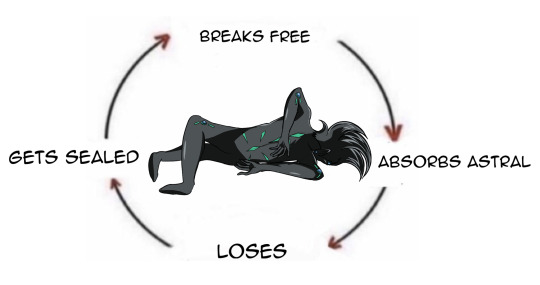
I feel like the writers just didn't know what to do with him at this point, he's as threatening as the Trix in Winx club (like- I can even draw parallels and similarities) and Astral keeps winning against him again and again cause 'Good triumph over evil yay', seriously I feel like he's a missed potential. Also can we talk about how many times he broke free? Like Astral, what lock are you using to seal him lmao?? (The writers doesn't even explain this btw)
Later on, No.96 just decided to trick Astral into releasing him and then for some reason decided to possess Donald Trump but good for him I guess.
ALSO
CAN WE TALK ABOUT THE PURPLE LIPSTICK
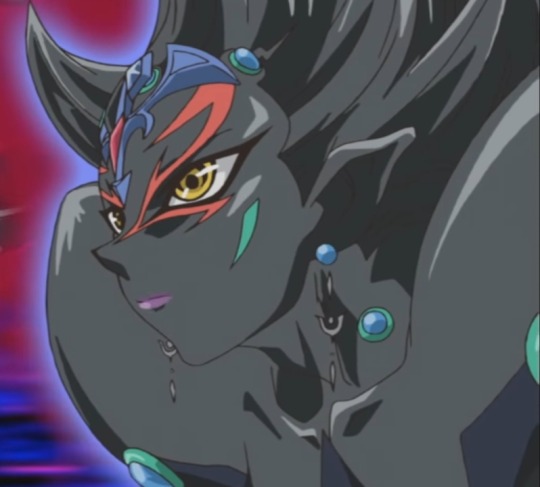
LIKE OMG, I KNOW HE WAS A FRUIT BEFORE, BUT THEY TOOK IT TO A WHOLE NEW LEVEL
He really put some lipstick and said "I'm a god now", can't blame him (Also I have to be honest about his God complex era, HE WAS SO ANNOYING, HE PROBABLY SAID "KAMI" MORE THAN KOTORI CALLING YUMA'S NAME)
Also him treating Vector as a pet while being used and Vector just seething inside was so funny to see, it's like a complete opposite end pair compared to Yuma and Astral.
Overall he's pretty solid, I just wish the writers treated him better and made him a more complex villain (like this guy wasn't in anyone's side they could have done so much more than "he bombs all three worlds cause he can now" like c'monnn they made him flat and one dimensional in the end compared to how he used to be???).
•All the people I ship romantically with this character
I like to ship him with Astral and Vector as a joke.
•My unpopular opinion about this character
He ate with the purple lipstick c'mon now
•One thing I wish would happen/had happened with this character in canon
I think I pretty much summed it up in the first part, but anyway he's not dead and alive in Zexal III canon.
#zexal#ygo zexal#yugioh zexal#dark mist zexal#black mist zexal#number 96 zexal#dark mist#black mist#zexal asks#character breakdown
7 notes
·
View notes
Text
Post s2e9 confirmations and speculations as of this ep, starting with confirmations and moving on to thoughts/speculations.
Before I start, just going to link my speculations as of a couple of episodes ago here because they're surprisingly either still relevant or have been confirmed either way. Of these, the main pieces still outstanding are Liu Min's phone and the serial murders.
Fountain boy low-key confirmed to be Liu Min's younger brother (Liu Xiao, apparently?). He knew Tianchen would soon be given the opportunity to "hunt" and lo, there is Liu Min (who even vaguely recognised Tianchen which makes sense if he's an acquaintance of his brother's). His own surname is Liu and obviously that's a pretty common name, but the fact he had someone driving him around means he's pretty rich and, well, son of a games company CEO seems pretty rich indeed. Apply law of conservation of detail and this one is now locked in at 95%. Fountain boy = Liu Xiao = "hunter" = hat guy (the last I'm a bit less certain of, but again, conservation of detail and there aren't many episodes left).
I'd been wondering about the weird focus the neighbour got in terms of his gaming so him being someone Liu Min wanted taken care of made that entire side of things click for me. Liu Min was terminally online and so was the neighbour. Tianchen must've thought it karma that he had this opportunity.
Third story: Tianchen as red eyes, going further and further as Tianxi is forced to watch until he goes too far even for her - at which point she broke free and tried to appeal to Lu Guang (but why him?). (All that said, Tianchen claims he killed both their parents, but we didn't actually see it properly in any of the flashbacks which could just be because they're being careful with the censors but I'm still side-eyeing it until we see exactly what happened. After all, there was no knife in the picture when we left the scene.) Tianxi's story I'm presuming is simply an animated version of what Tianxi is showing Qiao Ling to tell her story.
Speaking of, Tianxi "broke free" in her school uniform and that was also how she was found. Does that place the hoodie scenes in the hospital as before she fled? Because rewatching a bit of ep 4 and it seemed that QJ was talking to Tianchen-as-Tianxi then (could be wrong, 'Tianxi' never spoke that we heard in this scene but it being actual Tianxi rather than Tianchen raises so many more questions) which would imply she was missing after the hospital and that's when they implemented the disguising plan. Thinking about the "sorry" scenes in the third story and wondering if Chen Bin was the final straw for Tianxi.
First/second story: The Romeo and Juliet backstage they're at was indeed as I saw a few people speculating a production featuring Qian Jin's wife and her co-star. Tianchen "I killed them both" @ Qian Jin: wow he just like me fr. (But nah this definitely raises more questions about the murder of his wife). (Also, just to note that I'm putting the different perspective of QJ meeting LTX and LTC down to the unreliable nature of Xiao Li relaying info initially rather than alternate timelines. Can't rule it out, of course (and the blood on Tianxi in only one of the tellings has me even more hesitant), but unreliable narrator seems an easier fit at this stage. We also know QJ doctored the case files and if LTC outright told him "I killed them both" then that sure didn't make it to the files.)
Qian Jin's motives now back up in the air. Initially it seemed as though he wanted the powers so he could bring his wife back, but with the revelation that he had reason to believe she was cheating (and pregnant with the person she was cheating on him with) the idea he would want her back seems... a lot less likely. Also, his break from morals is placed a lot earlier than it seemed from the outside. Those in the police thought he was outstanding etc etc until his wife died, but he was gone long before that. Ultimately, in both cases with alleged cheating it doesn't matter if the person themselves was cheating because they didn't deserve to be killed for it, but it is fascinating that we're presented with these two similar scenarios from two entirely different perspectives. Li Tianchen and Tianxi as victims of domestic abuse by the person who believes they're being cheated on whilst Qian Jin is the role of the husband who believes he's being cheated on. (The way the pregnancy reveal is played - QJ not seeing his wife often because he was always at work, her startling when caught on the phone - it does seem like he takes the pregnancy as confirmation that she was cheating as the pregnancy couldn't have been with him. She's already dead at that point though.)
With the current timeline we have, I don't know whether QJ engineered the initial killing of his wife (and the fact the culprit escaped legal justice actually kinda makes me think that he didn't), but I do think he used Tianchen after the fact to set up the suicide and suicide note of the killer
The serial killings. We originally believed there were eight in total, starting with Emma. However, this episode shifts the timeline somewhat. Liu Min says thank you for dealing with "that woman", but he still seems to have use of his legs so presumably "that woman" isn't Emma and this is taking place beforehand. Which would imply there are a number of extra victims the police haven't uncovered. (The alternative is that this flashback was in a timeline before the Emma stuff went so wrong and Liu Min still had use of his legs? I'm really hoping it's not this because it'd break my brain a bit) This also somewhat explains how the police were unable to tie motives together for the serial killings if it was a killing-for-hire type scenario, though I do still somewhat believe there's some underlying logic that QJ either bought into himself or was able to make Tianchen buy into in order to believe the victims weren't "innocent"
#link click#link click spoilers#shiguang daili ren spoilers#this is less down the speculation end but I loved the intertwining metaphors in the entire 'hunter' thing throughout#as well as the parallels about the cheating and the lack of total confirmation around that#because it makes you compare the two scenarios and wonder#as well as qian jin and what he saw in li tianchen because I think he saw himself honestly#he didn't know at this stage about his powers so that's not why he took to him#(also. unrelatedly. I really don't think we're done with chen bin. he's a loose end (not) walking)#oh and I don't want to edit my older spec post but I do now think tianxi is the one with the phone double crossing the other two#which should be clear enough from what we now know but the whole hospital timeline is funky so thought I'd say
17 notes
·
View notes